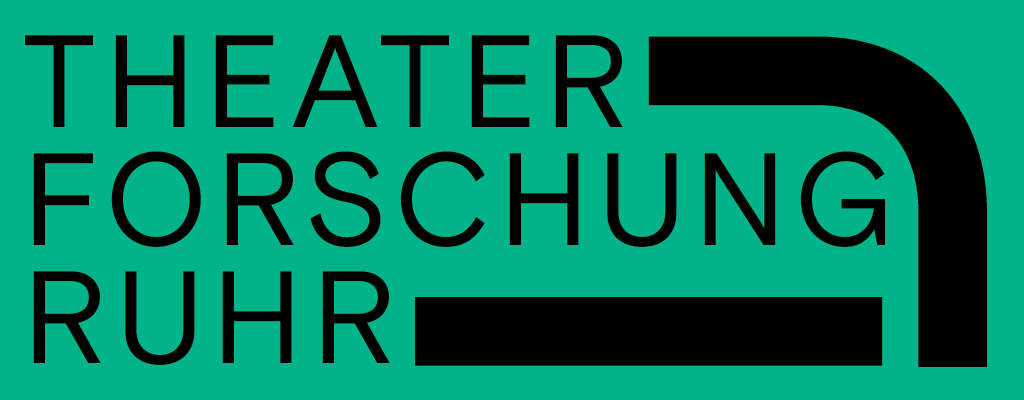
Im Rahmen der Vortragsreihe „Theater Forschung Ruhr“ stellen internationale Forscher*innen ihre aktuelle Arbeit in einem wissenschaftlichen Vortrag vor.
Anstehende Termine im Wintersemester 25/26
- 17. Januar, 9.30-17.30 Uhr: Workshop „Artistic and Activist Counterpublics in Light of the Neo-Authoritarian Shift“ (Tanzhaus NRW Düsseldorf und Forum Freies Theater Düsseldorf)
- 06. und 07. Februar: Workshop „Rehearsals, Working Modes, Performance as Research“ (AT), (Tanzhaus NRW und FFT Düsseldorf)
Artist Talk with Idylla Silmarovi and Rika Sakalak: „The Conditions We Produce“
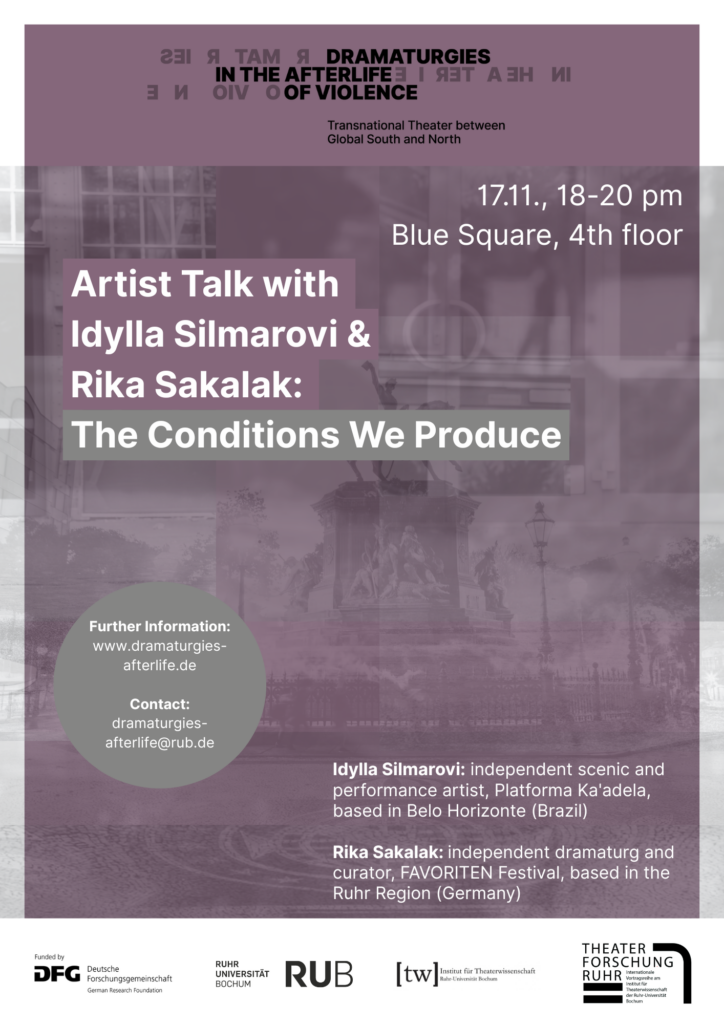
Mo. 17th November 2025, 18-20 pm, Blue Square, 4th Floor
An event by the Emmy-Noether junior research group „Dramaturgies in the Afterlife of Violence: Transnational Theater between Global South and North„
The so-called free theater scene is increasingly shaped by small, temporary working groups in favor of enduring regional and global networks. This talk invites the scenic and performance artist Idylla Silmarovi (Ka’adela Platform, Belo Horizonte) and the dramaturg and curator Rika Sakalak (FAVORITEN Festival, Dortmund), each from distinct local contexts, to discuss how conditions of production shape contemporary artistic practices and their aesthetic formats.
Which educational, cultural, and political guidelines condition residencies and collaborations? What aesthetic and political processes can—or cannot—emerge from the infrastructures that host them? What traps and contradictions confront guerrilla, decolonial, Black, and feminist strategies under the cultural policies of „sovereign diversity“ proposed by institutions such as UNESCO and embraced by neoliberal democracies? Where do artistic ideas meet—or attempt to transgress—these institutional frameworks in imagining a desirable, yet still unknown, world.
Mediation: Felipe dos Santos Boquimpani (Institute for Theatre Studies, RUB)
Idylla Silmarovi is a performing artist and researcher. She holds a Master’s degree in Performing Arts from the Federal University of Ouro Preto, with research entitled „Strategies of art in a state of guerrilla warfare.“ Born Contagem (Brazil) she investigates the intersections between art and activism within the performing arts, mainly regarding the debate surrounding memory as a right denied by the colonial system in Abya Yala (Americas). In addition, her practice and research are directly related to feminist and racialized LGBTQIA+ struggles. Idylla is the creator of the Ka’adela Platform and the Meeting Zone. She also collaborates with various collectives and movements such as Cia Brasileira de Teatro, Toda Deseo, Plataforma Divinas, Academia TransLiterária, Cia Circunstância, and was artist-in-residence at PACT Zollverein and Frankfurt LAB°.
She creates autonomous spaces for creation. She seeks to sink caravels.
Rika Sakalak, born and raised in Athens, works as a dramaturge, curator, and diversity manager in North Rhine-Westphalia. She earned two Master’s degrees in Comparative Literature and Theatre Studies at Ruhr-University Bochum (RUB) in 2022 and has co-edited articles and anthologies as well as held a teaching assignment on Dramaturgies of Resistance at the same University in 2023. Since 2021, she has freelanced as a dramaturge and curator with artists, collectives, and festivals. From 2022 to 2024, she was dramaturge at Ringlokschuppen Ruhr, managing cultural networks such as LAG Soziokultur, four.ruhr, the Tanzproduzent*innen Konferenz (TPK), and Landesförderung Neue Normalität. She collaborates with Nora Amin, Martin Ambara, Kati Masami Menze, and Édith Voges Nana Tchuinang. Rika is an elected member of the Bochum Cultural Commission and deputy chair of Kunst und Handlung e.V..
Currently Rika is artistic director of the FAVORITEN Festival (2026) with Jonas Leifert and dramaturge/coordinator for West Off Festival.
Grit Köppen: „Entgegen scheinbarer Befriedung: Dekoloniale Ästhetiken im Sprechtheater“
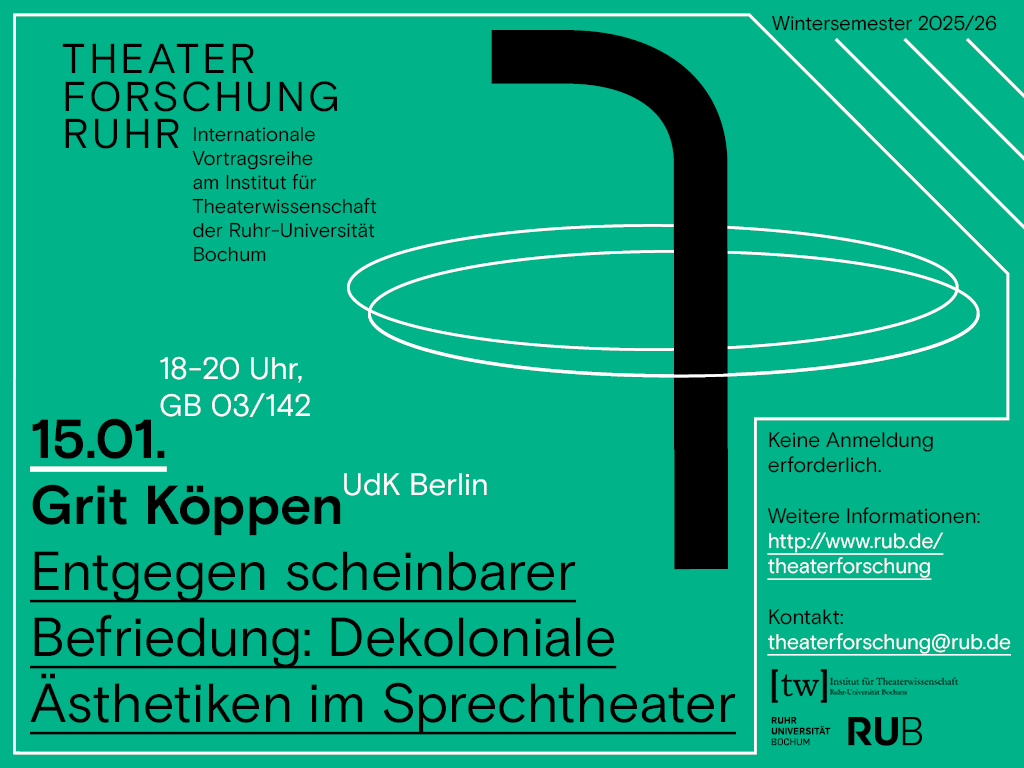
Do. 15. Januar, 18-20 Uhr, Uni Campus, GB 03/142
Dekoloniale Ästhetiken sind keineswegs auf Begriffe und Praktiken wie „de-linking“ (Mignolo) oder „un-learning“ (Spivak) allein zu reduzieren, auch wenn diese in der späten Rezeptionsgeschichte des Dekolonialen Prominenz im Diskurs gewonnen haben.
Allein in Bezug auf aktuelle Theatertexte von afrikanischen und afro-diasporischen Autor*innen lässt sich ein breites Spektrum dekolonialer Ästhetiken identifizieren. Ausgehend vom empirischen Material – den Stücken selbst – argumentiere ich, dass sich das Spektrum dekolonialer Ästhetiken mindestens zwischen zwei Polen aufspannt, einer Ästhetik des Aufruhrs und einer Ästhetik der Transgression.
„Wir sind im Krieg. Lasst uns im Krieg bleiben“ sagt eine der Figuren im Modus des Aufruhrs in Dieudonné Niangounas Stück „Nennt mich Muhammad Ali“. Das lässt sich gleichermaßen als drastische Provokation und als Resonanz auf die globale postkolonial-kapitalistische Situation lesen. Im zeitgenössischen Sprechtheater afrikanischer und afro-diasporischer Autor*innen wird die koloniale Situation mit einem Aufschrei erinnert und die postkoloniale Situation als Folge der Gewaltverhältnisse scharf kritisiert. Mittels Theater nehmen Künstler*innen hier eine widerständige Erhebung gegen rassistische, klassistische und sexistische ökonomische, körperpolitische und sprachliche Zurichtungen vor. Zugleich ist in den Stücktexten eine Ästhetik der Transgression gestaltet, bei der dekoloniale Visionen von Welt möglich werden.
Wie wird die aktuelle postkoloniale Realität im Theater reflektiert? Was wird aus Perspektive subalterner Figuren in den Stücktexten artikuliert und gespiegelt? Was entäußert sich im kritischen Blick auf den Westen? Wie gestalten Bühnenautor*innen eine Ästhetik des Aufruhrs und eine Ästhetik der Transgression? Lassen sich dem gegenüber aus den Stücktexten, ihren Dramaturgien, konzipierten Figurenrelationen und -reflexionen auch künstlerische und gesellschaftliche Utopien ableiten?
Grit Köppen ist seit 2024 Gastprofessorin an der Fakultät Darstellende Kunst der Universität der Künste Berlin. Und sie lehrt seit 2017 im Bereich Szenisches Schreiben an der UdK. 2025 erschien ihr Buch „Dekoloniale Äshetiken im zeitgenössischen Theater“ bei Theater der Zeit.
www.gritkoeppen.de
Archiv
Sommersemester 2025
Eliane Beaufils: „Performative forms of spectatorial ecologization“
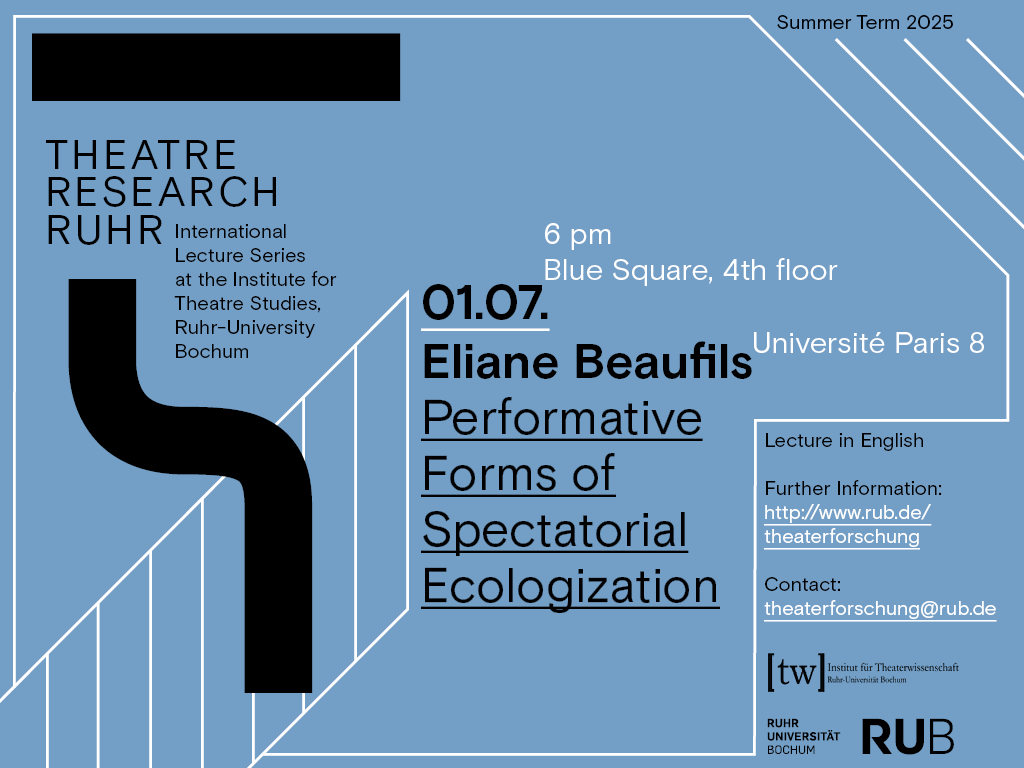
Tuesday, 1st of July, 6 pm, Blue Square, 4th floor
In the face of ecological catastrophe, cognitive messages proved insufficient. Many thinkers are calling on the suggestive powers of the arts. Even if we may question the vocation of the arts to radically change imaginations and perceptions, this contribution would like to investigate the potential galvanization of the imagination through experiential dramaturgies. It will look at two spectacular modalities that aim to promote not only an ecological thinking (Morton) by the spectators, but also an ecological becoming. First, I will analyze the potential effects of the guided meditations that have been proliferating in recent years. Then I will examine new role-playing games shared with spectators. Finally, I would like to consider the importance of the contexts of these worldbuilding activities.
Eliane Beaufils is Professor of Theatre Studies at the University Paris 8. Her research has adopted various focuses on contemporary criticalities and on spectatorial autopoiesis, as in the books Being-With in Contemporary Performing Arts(ed. with Eva Holling, Neofelis, 2018), and Toucher par la pensée. Théâtre critique et résonances poétiques, Hermann, 2021. Since 2018, she has been researching on the projects Theater facing Climate Change and Stages for a new world(„Scènes pour un monde nouveau“, with Flore Garcin-Marrou). In this context, she has published twenty articles and Dramaturgies des plantes, Tangence, n° 132 (online), as well as L’Écologie en scène. Théâtres politiques et politiques du théâtre, PUV, 2024.
Elisabeth van Treeck: „Wie wir wohnen könnten. Feministische Raumpolitiken im zeitgenössischen Musiktheater“
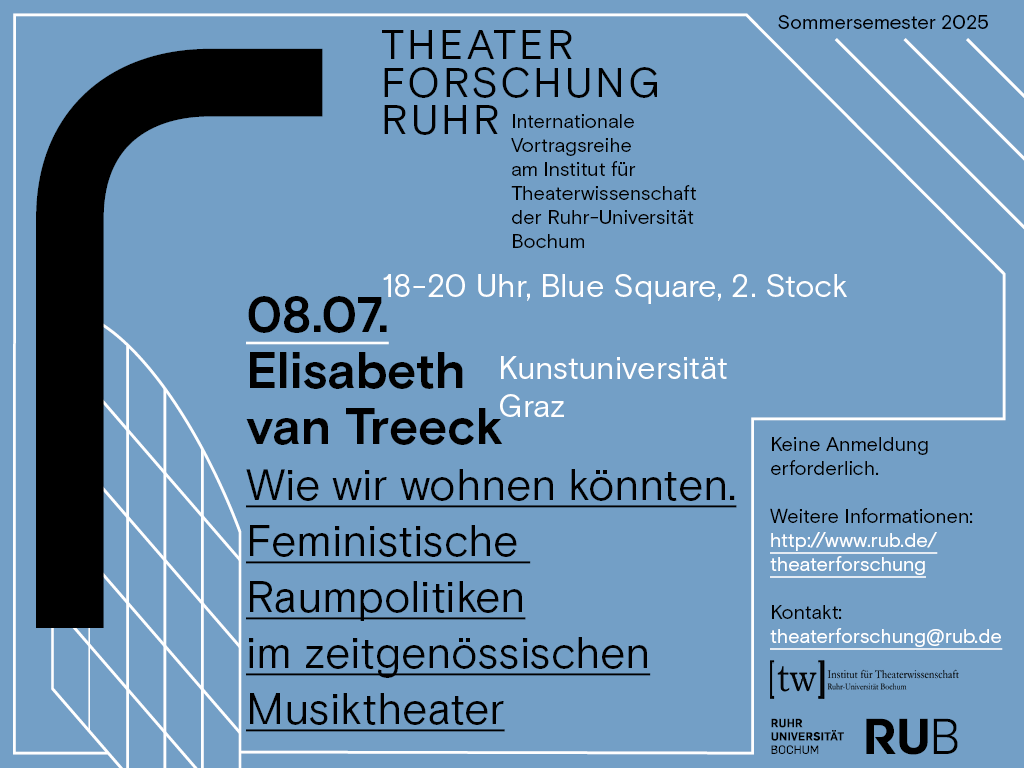
Dienstag, 08. Juli, Blue Square (2. Stock)
Ausgehend von der These, dass Musiktheater ein kritisches und zugleich utopisches Medium feministischer Raumproduktion sein kann, untersucht der Vortrag, inwiefern zeitgenössisches Musiktheater bestehende Raumordnungen irritiert und alternative Modelle des Wohnens erfahrbar macht. Im Zentrum stehen zwei ortsspezifische Produktionen: HAUS von Sarah Nemtsov und Heinrich Horwitz (Ruhrtriennale 2022) sowie [K]1 Zimmer Wohnung vom Performancekollektiv Untere Reklamationsbehörde in der Wiener Fassung (2024), die in der ehemaligen Wohnung der Architektin Margarete Schütte-Lihotzky stattfand. Beide Inszenierungen machen architektonisch markierte Räume – die industrielle Turbinenhalle und den von widerständiger Wohnpolitik geprägten Erinnerungsort – zum Ausgangspunkt einer künstlerischen Auseinandersetzung mit Zugehörigkeit, Intimität und gesellschaftlicher Normierung. Durch ihre spezifische klangliche, performative und räumliche Gestaltung verschränken die Werke Fragestellungen nach häuslicher Sicherheit und struktureller Gewalt. Der Vortrag legt dar, wie in diesen Arbeiten häusliche Ordnungen aufgebrochen und feministische Raumpolitiken als erfahrbare, körperlich situierte und widerständige Praxis imaginiert werden.
Elisabeth van Treeck ist seit 2024 als Senior Scientist Postdoc für Musik- und Theaterwissenschaft am Zentrum für Genderforschung und Diversität der Kunstuniversität Graz tätig. Zuvor war sie von März bis Dezember 2023 Postdoc am DFG-Graduiertenkolleg „Das Dokumentarische. Exzess und Entzug“ an der Ruhr-Universität Bochum sowie ebendort von 2014 bis 2023 wissenschaftliche Mitarbeiterin am Institut für Theaterwissenschaft. Sie studierte Musikwissenschaft in Graz und Bern, absolvierte einen Studienaufenthalt an der Yale University und ein M.A.-Studium in Theaterwissenschaft in Bochum. Die Promotion erfolgte 2021 „summa cum laude“ an der Professur für Musikwissenschaft der Universität Bayreuth. Ihre Dissertation mit dem Titel „’…da das Wirkliche konstant in Schwebe bleibt…‘. Klang- und Bilddramaturgien des Suspense in Olga Neuwirths Lost Highway“ wurde 2023 mit dem Hermann-Abert-Preis der Gesellschaft für Musikforschung ausgezeichnet (erschienen utzverlag 2024). Veröffentlichungen liegen vor zu Olga Neuwirth, u.a. zu den Countertenor-Rollen, zu „Le Encantadas“ und zu „American Lulu“, (zeitgenössischer) Oper und Medien und Michel van der Aa (Sammelband Wolke Verlag 2024). Aktuell beschäftigt sie sich mit Facetten von Heim, Haus und Herd sowie Gender/Diversität und Raumpraxen im zeitgenössischen Musiktheater. Sie ist Co-Sprecherin der Fachgruppe Musiktheater der Gesellschaft für Musikforschung.
Frieda Ekotto: „Towards a Phenomenology of the Body“
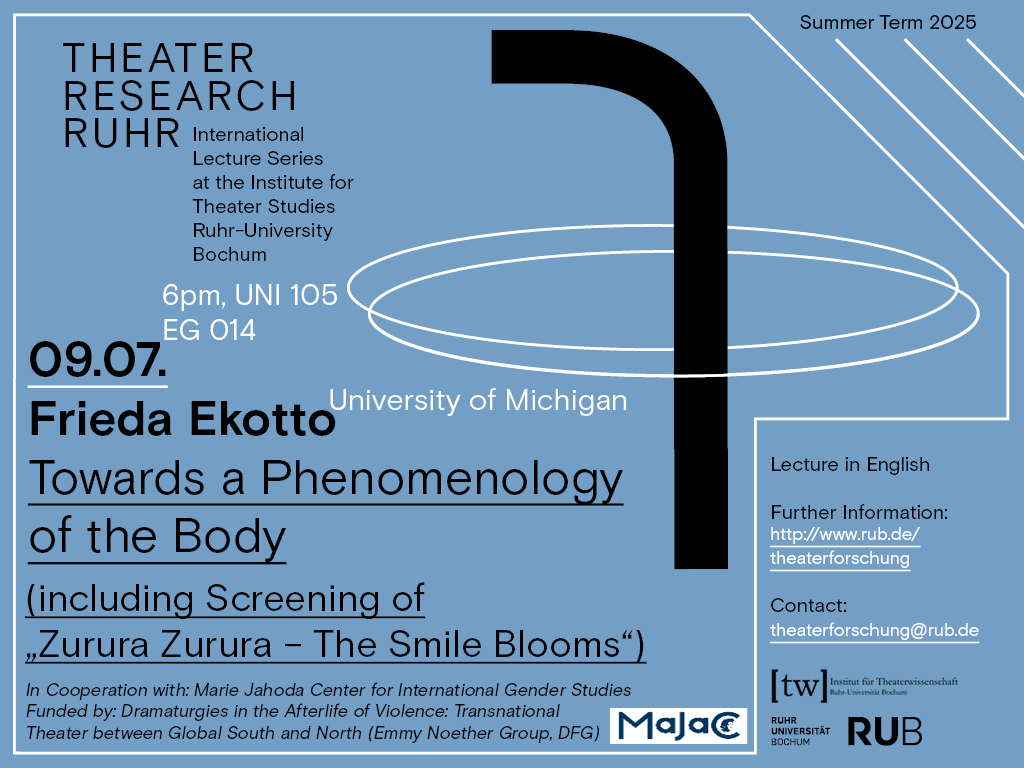
Wednesday, 9th of July, 6 pm, Universitätsstr. 105, Bochum, Raum EG 014
“My final prayer:
O my body, make of me always a man who questions!”
Franz Fanon
Black Skin, White Masks (1952)
Zurura Zurura: The Smile Blooms is a visual philosophical essay. Grappling with how, or even if, a Black body is able to represent a site of power, I would like to raise a crucial question for us to consider: How are queer, Black queer bodies talked about? Is there an epistemology of queering blackness, a language, a new tool of reflection for a new grammar for a queer Black woman in the world? Attending to the possibility of this new epistemology which opens possibilities for a language that can articulate the experiences of Black LGBTQIA2S+ (Lesbian, Gay, Bisexual, Transgender, Questioning, Intersex, Asexual and Two-Spirited) individuals. In my work, I am looking for ways to imprint the possibility of this new language in a way that changes the gaze of my Black body as well as its grammar for future generations.
On July 10 from 10 a.m. to 12 p.m., there will be a workshop with Frieda Ekotto, which is open to anyone interested (especially doctoral candidates and postdocs). Building on the lecture from the previous evening, the workshop will discuss several of Ekotto’s texts. Please register in advance to receive the texts: dramaturgies-afterlife@rub.de.
Frieda Ekotto is Lorna Goodison Collegiate Professor of Afroamerican and African Studies, Comparative Literature and Francophone Studies at the University of Michigan. As an intellectual historian and philosopher with areas of expertise in 20th and 21st-century Anglophone and Francophone literature and in the cinema of West Africa and its diaspora, she concentrates on contemporary issues of law, race and LGBTQIA2S+issues. Her primary research to date has focused on how law serves to repress and mask the pain of disenfranchised subjects; her intention in this work is to trace what cannot be said in order to address and expose suffering from a variety of angles and cultural intersections and reassess the position and agency of the dispossessed. She is the author of multiple books, and numerous book chapters as well as many articles in prestigious literary journals. She is currently working on LGBTQIA2S+ issues, with an emphasis on Sub-Sahara African cultures within Africa as well as in Europe and the Americas. In addition to her academic work, she is also a creative writer. She received the Nicolàs Guillèn Prize for Philosophical Literature in 2014 and in 2015 she was awarded the Benezet Award for excellence in her field. In 2016, she was awarded the John H. D’Arms Faculty for Distinguished Graduate Mentoring in the Humanities at the University of Michigan, Ann Arbor. In 2018, she was awarded an Honorary Degree at Colorado College. She has produced two documentaries in 2017 Vibrancy of Silence: A Discussion with My Sisters and in 2021 Zurura Zurura: A Smile Blooms as part of the ongoing research on Vibrancy of Silence: Images and Cultural Production of Sub-Saharan African Women. She was the President of Modern Languages Association (2023-2024.)
Wintersemester 2024/25
Pedzisai Maedza: „Speaking for the Dead: Contemporary Performance Artists in the Archive“
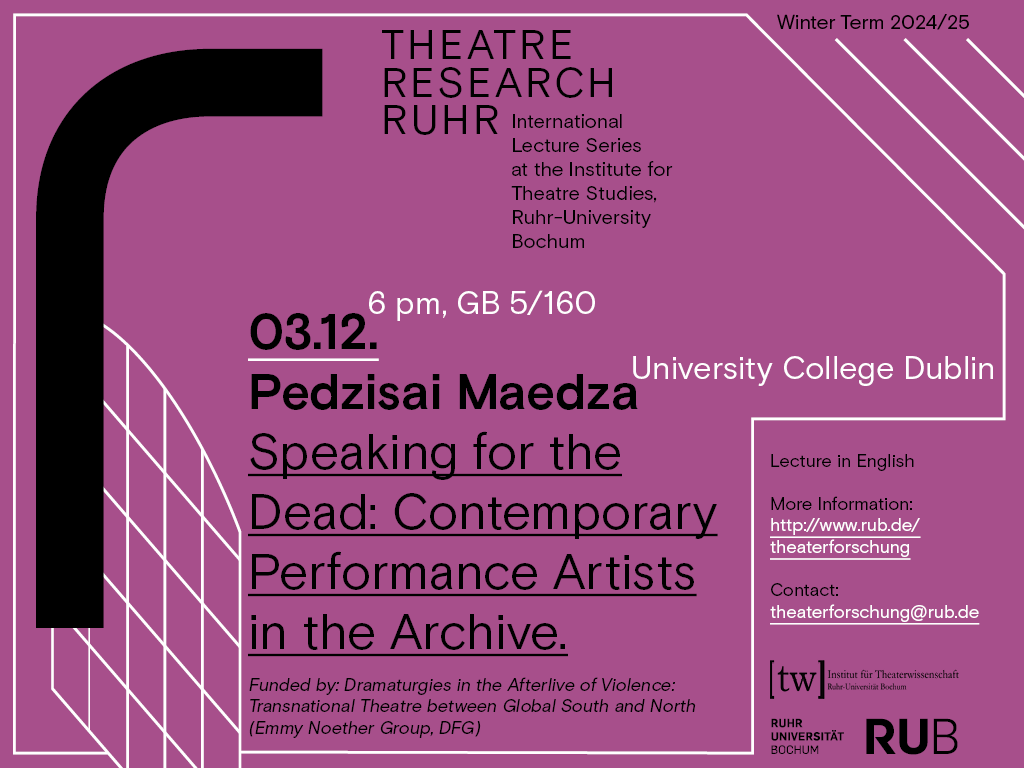
Tuesday, 3rd December, 6-8 pm, Campus RUB, Room: GB 5/160
Lecture in English
This talk considers the role of performance dramaturgy in remembering, memorializing and sustaining the memory of the 1904 to 1908 genocide in Namibia, sometimes dubbed Germany’s forgotten genocide. It frames performance as a media through which this history is narrated and transmitted. The talk interrogates how contemporary artistic and cultural performances and performance-makers inform the ways in which the history of colonial genocide and the present are presented and remembered. It investigates how memories circulate across time and place- transnationally and across generations in response to the social amnesia surrounding the first genocide of the 20th Century. This cross-border and trans-generational reflection is essential to understanding how the genocide in Namibia has and is articulated, circulated, and remembered through performance.
Pedzisai Maedza is an Assistant Professor in Theatre, Drama and Performance Studies at University College Dublin, Ireland. Prior to this he was a British Academy Newton International Fellow at the University of Warwick, United Kingdom. He is the author of Performing Asylum: Theatre of Testimony in South Africa and has published several book chapters and peer-reviewed articles in internationally recognised journals on Performance, Genocide and Cultural Memory.
This lecture is organized in cooperation with Prof. Dr. Henriette Gunkel and Dr. Julia Schade from the Institute of Media Studies.
Ruth Sonderegger: „Emancipation or Violence? Aesthetic Education from Kant to Spivak“
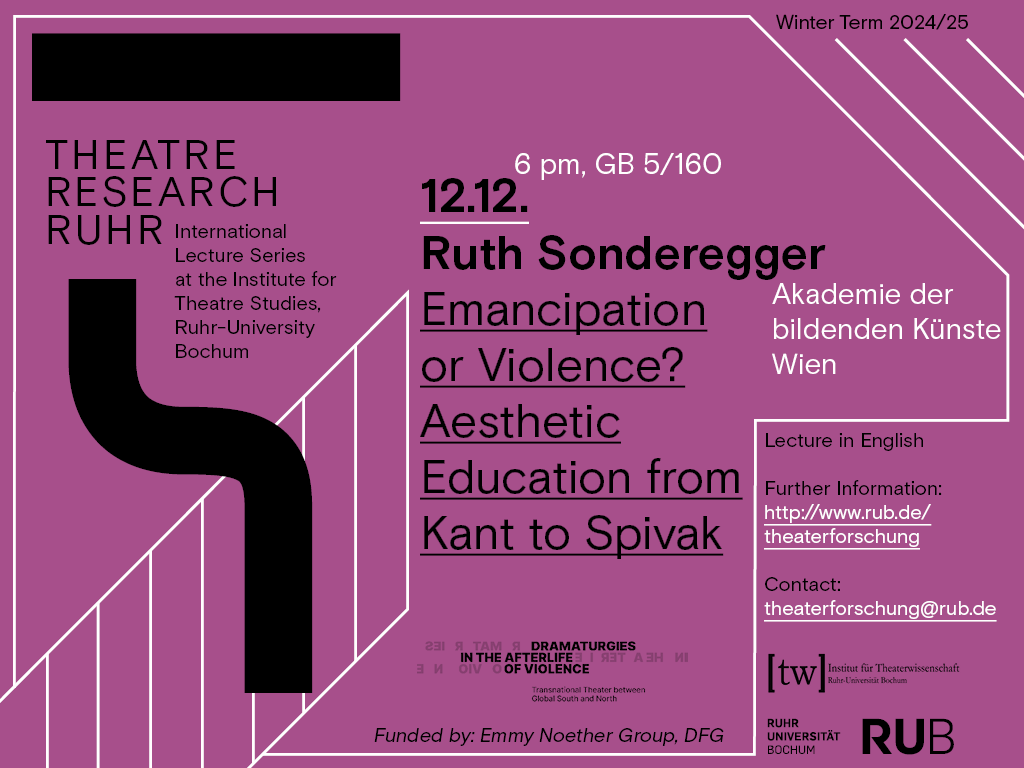
Thursday, 12th December, 6-8 pm, Campus RUB, Room: GB 5/160
zum Videomitschnitt (Passwort auf Anfrage)
Lecture in English
Recent writings by Jacques Rancière and Gayatri Spivak suggest that Kant and Schiller’s theories of aesthetic education have a vogue, and that aesthetic education is (still) considered particularly emancipatory. In my talk I will first argue that Kant and Schiller’s accounts of aesthetic education are all but unproblematic; especially if judged on their respective emancipatory aspirations. In a second step I will investigate into circumstances under which aesthetic experiences might work in an emancipatory way, nevertheless; in a way, however, that goes against the grain of Kant and Schiller’s theories of aesthetic education. In my conclusion, which is also an overture, I will finally return to Spivak and Rancière but with the aim of transcending them in favour of Fred Moten’s social aesthetics.
Ruth Sonderegger is Professor of Philosophy and Aesthetic Theory at the Academy of Fine Arts Vienna. Her main fields of research are the history of aesthetics (in the context of colonial capitalism), practice theories, and cultural as well as resistance studies. Together with Katja Diefenbach and Pablo Valdivia she is currently conducting a research project entitled “Perception, Jurisdiction, and Valorization in Colonial Modernity. On the Nexus of Accumulation, Race, and Aesthetics (https://accumulation-race-aesthetics.org/). Her publications include Art and the Critique of Ideology After 1989 (co-edited with E. Birkenstock, M. J. Hinderer Cruz, and J. Kastner, 2013); Pierre Bourdieu und Jacques Rancière. Ästhetisches Regime oder ästhetische Disposition? (co-edited with J. Kastner, 2014); Vom Leben der Kritik. Kritische Praktiken – und die Notwendigkeit ihrer geopolitischen Situierung, 2019; Polyphone Ästhetik (co-authored with Christoph Brunner, Sofia Bempeza, Katharina Hausladen, and Ines Kleesattel, 2019). She is part of the publishing collective transversal texts (https://transversal.at/).
Philipp Goll: „Die andere Seite der Pipeline|Extraktivistische Infrastrukturen zwischen Ruhrgebiet, Ukraine und Sibirien„
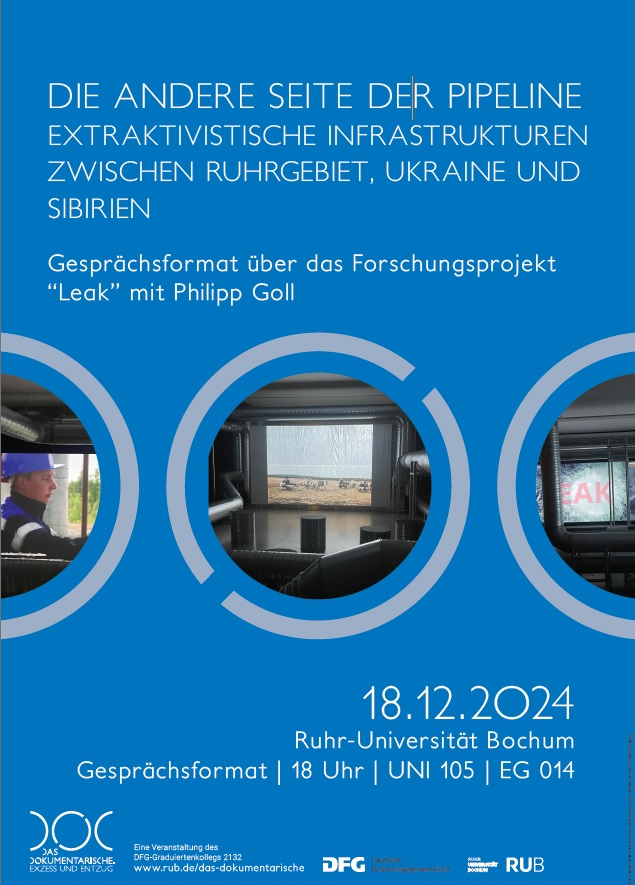
Mittwoch, 18. Dezember, 18-20 Uhr, Uni 105 EG, 014 (Universitätsstr. 105, 44789 Bochum)
Um Anmeldung via Mail an das-dokumentarische@rub.de wird gebeten.
Eine Veranstaltung in Kooperation zwischen Theater Forschung Ruhr und dem Graduiertenkolleg „Das Dokumentarische“.
Die aus einer gemeinsamen Recherche von Oleksiy Radynsky, Hito Steyerl und Philipp Goll hervorgegangene Ausstellung „Leak. Das Ende der Pipeline“ (MdBK Leipzig 2024) betrachtet den andauernden Russischen Angriffskrieg gegen die Ukraine aus der Perspektive der langen Geschichte des Russischen Imperialismus. Eine These ist, dass der Extraktivismus Dreh- und Angelpunkt für die heutige koloniale Politik Russlands ist und sich maßgeblich unter deutscher Beteiligung entwickelte. Im Mittelpunkt steht das „Jahrhundertgeschäft“ über Erdgas-Lieferungen zwischen der Bundesrepublik und der Sowjetunion, das am 1. Februar 1970 im Essener Kaiserhof unterzeichnet wurde. In diesem Dreiecksgeschäft wurden Stahlrohre aus den Mühlheimer Werken der Mannesmann-AG gegen Sibirisches Erdgas getauscht und von der Essener Ruhrgas AG vertrieben. Der Deal war zentral für die „Neue Ostpolitik“ unter Willy Brandt (SPD), die unter dem Motto „Wandel durch Handel“ politische Entspannung durch wirtschaftliche Verflechtung zu erwirken versuchte.
Heute ist die andere Seite des als Friedensprojekt lancierten Erdgas-Röhrentauschs offensichtlich. Vor allem die Ukraine wurde darin zur Verhandlungsmasse, wie zuletzt die russische Invasion in der Ukraine 2022 deutlich machte. Wenig bekannt ist dagegen, dass mit dem russisch-deutschen extraktivistischen Joint-Venture zur Erschließung fossiler Energiequellen eine Zerstörung von Natur und indigenem Lebensraum verbunden ist. Während Willy Brandt dank des Energiehandels vermeintlich „sauberes“ Erdgas importierte und damit sein umweltpolitisches Versprechen – „Der Himmel über dem Ruhrgebiet muss wieder blau werden“ – unterstrich, wurde der Dreck der imperialen Lebensweise urbaner Zentren im Westen nach Sibirien ausgelagert. Dort durchziehen die extraktivistischen Infrastrukturen Gebiete wie z.B. die Jamal-Halbinsel, die nicht nur die gigantischen Erdgasfelder beherbergt, sondern Lebensraum für die seit Jahrhunderten mit ihren Rentieren nomadisch lebenden Nenzen ist, deren traditionelle Lebensweise der Extraktivismus zerstört.
Philipp Goll wird in dieser Veranstaltung das gemeinsame Rechercheprojekt vorstellen und einige Bestandteile präsentieren. Im Anschluss ist Zeit zur gemeinsamen Diskussion über das konkrete Projekt sowie übergreifende Diskurse rund um extraktive Infrastrukturen, Imperialismus und Kolonialismus sowie die Rolle ästhetischer Fragen und künstlerischer Arbeit in diesem Kontext.
Organisiert und moderiert wird der Abend von Gerko Egert (Institut für Theaterwissenschaft), Philipp Hohmann (Das Dokumentarische) und Lana Uzarashvili (Das Dokumentarische).
Marten Weise: „Dialog nach dem Dialog. Eine Denkfigur in Theater, Literatur und Theorie nach dem bürgerlichen Trauerspiel“
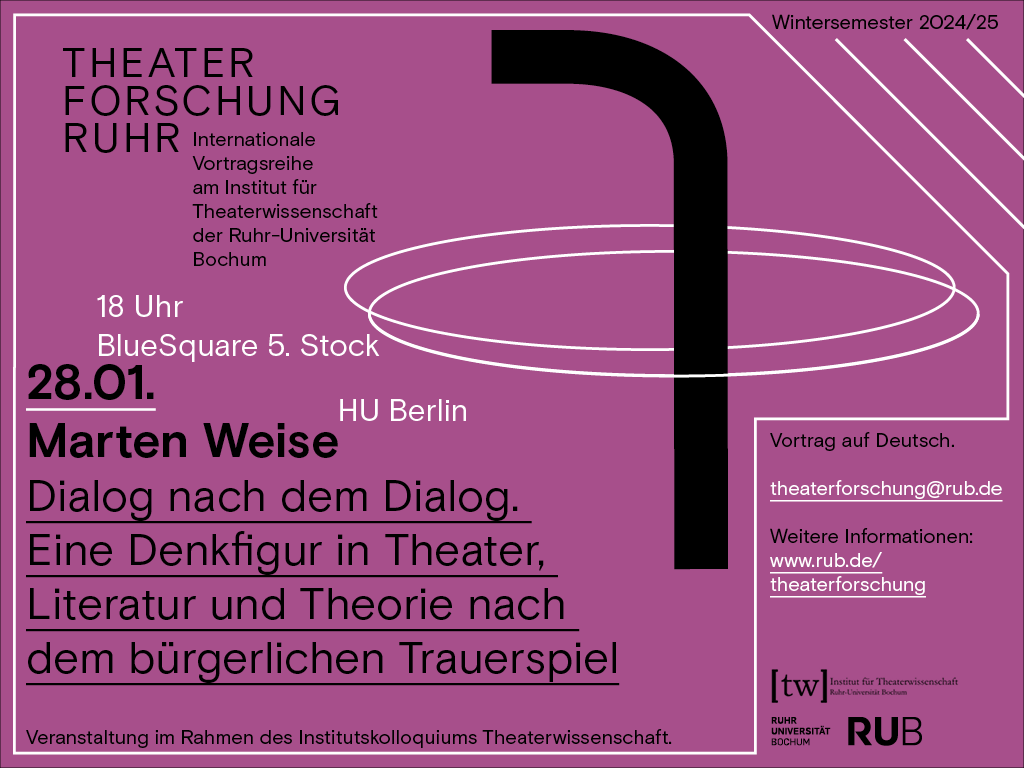
Dienstag, 28. Januar 2025, 18-20 Uhr, BlueSquare 5. Stock
(Veranstaltung im Rahmen des Institutskolloquiums Theaterwissenschaft)
Der Dialog ist das entscheidende formale Merkmal des bürgerlichen Theaters um 1800. In ihm kommen Gattungspoetologie und idealistisch-aufgeklärte Perspektive auf den Menschen als Handlungsträger in der Welt und der dramatischen Literatur zusammen. Dass das Theater die Vorstellungen von der bürgerlichen Gesellschaft formt, verdeutlicht etwa G. E. Lessings Hamburgische Dramaturgie, in der die Idee einer sich in der Sprache des Dialogs fühlenden Menschheit verhandelt wird. Dieses für das Theater wie die soziale Sphäre kolportierte Dialog-Ideal gilt heute als überholt. Schon seit dem 19. Jahrhundert verdeutlichen Kommunikationskrisen, Modernitätserfahrungen unterschiedlicher Ausprägung und gesellschaftliche Entfremdung zunehmend, dass die Behauptung der Möglichkeit eines symmetrischen Dialogs bestehende Ungleichheiten und konkrete Machtverhältnisse vielmehr verschleiert, statt sie aufzuheben. Nicht zuletzt ist die Annahme einer allgemeinen Vernunftgrundlage seit Auschwitz fragwürdig geworden.
In dem auf seinem 2024 erschienenen Buch „Dialog als Denkfigur“ beruhenden Vortrag stellt Marten Weise die Frage nach einem „Dialog nach dem Dialog“, die den Dialog – anstatt ihn zu verwerfen – ausgehend von Widersprüchen und Unzulänglichkeiten sowie einer geschichtsphilosophischen Beschreibung als unerfülltes Ideal und missglückte Verwirklichung neu zu verstehen sucht.
Dr. Marten Weise forscht und lehrt an der Schnittstelle von Literatur, Theater und Philosophie. Er ist wissenschaftlicher Mitarbeiter am Institut für deutsche Literatur der HU Berlin und im BMBF-Projekt „Dramaturgien eines Archivs“, wo er DDR-Theatergeschichte(n) im Inszenierungsarchiv der HfS Ernst Busch Berlin erforscht. Zuvor war er u. a. an den Instituten für Theater-, Film- und Medienwissenschaft und Allgemeine und Vergleichende Literaturwissenschaft an der Goethe-Universität Frankfurt am Main tätig (2016/17, 2021-2024) und Promotionsstipendiat der Hans-Böckler-Stiftung (2017-2021).
Sommersemester 2024
Theater Forschung Ruhr presents: Artist Talk mit der Compagnie La Fleur (Côte d’Ivoire/Deutschland/Mexiko): „Konami – der Fußballtanz“ und andere Projekte
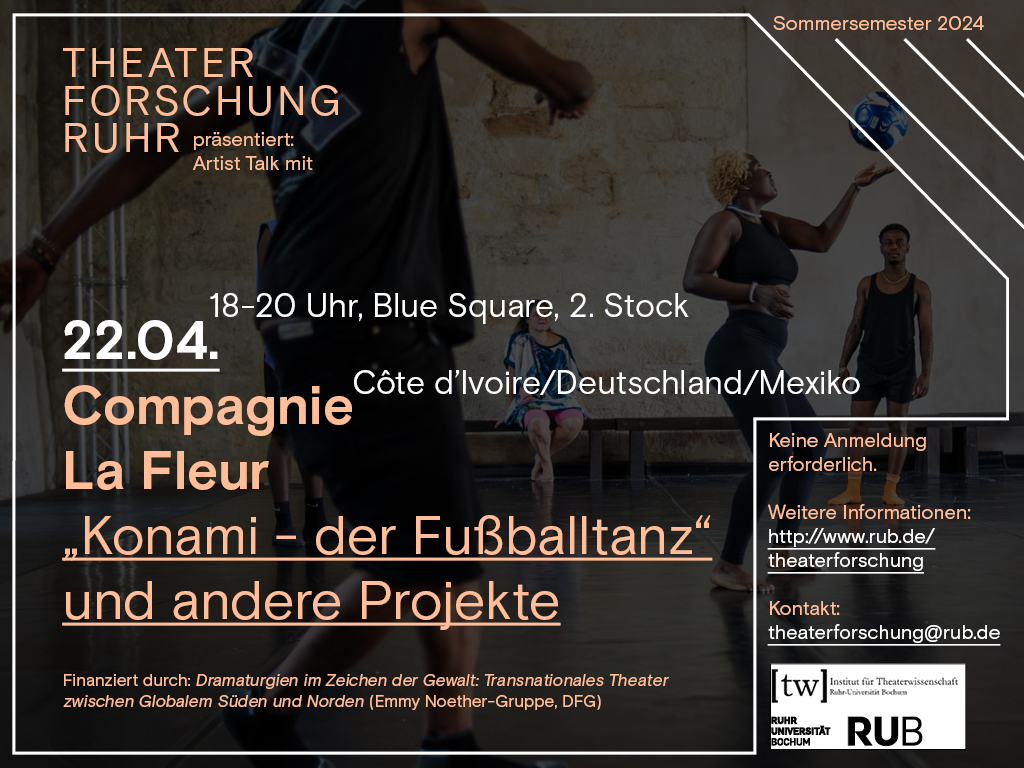
Montag, 22. April, 18-20 Uhr, BlueSquare, 2. Stock
Gespräch und Diskussion in Deutsch, Englisch und Französisch (direkte Übersetzung vor Ort)
Die Performancegruppe La Fleur wurde von der Regisseurin Monika Gintersdorfer und dem Choreografen Franck E. Yao gegründet. Sie bringt Performer*innen aus unterschiedlichen Kontexten und Generationen in Form eines transnationalen Ensemble zusammen. Beim Artist Talk am Bochumer Institut stellt die Gruppe ihre Arbeit vor und fokussiert dann ihr jüngstes Projekt: „Konami – der Fußballtanz“, das kurz darauf am 26.-28. April 2024 im FFT Düsseldorf zu sehen sein wird. Bereits am Freitag, den 19. April, veranstaltet die Gruppe ein öffentliches Showing auf dem Lessingplatz Düsseldorf.
Konami ist ein Straßen-Tanz, der sich in der Elfenbeinküste einer großen Popularität erfreut und für die einzigartige Verknüpfung von Fußball und dem Tanzstil Coupé Décalé steht. Für ihr Stück „Konami – der Fußballtanz“ hat La Fleur sich nicht nur mit diesem besonderen Tanz auseinandergesetzt, sondern auch mit den Verstrickungen von Macht, Geld und Korruption, von denen der Profi-Fußball mittlerweile nicht mehr zu trennen ist. La Fleur erzählen die Geschichte des kulturellen Transfers und der Migration zwischen Afrika und Europa und bringen sie aus unterschiedlichen Perspektiven auf die Bühne.
Die Mitglieder von La Fleur kommen aus den Bereichen urbaner Tanz, Schauspiel, Fashion, bildende Kunst und Popmusik, prägende Mitglieder sind u.a. die urbanen Tänzer*innen und Showbizzstars Annick Choco, Alaingo, Mishaa und Ordinateur, die Performerin und Choreografin Elisabeth Bakambamba Tambwe, die Tänzer*innen Alex Cephus, Dalel Bacre, Arturo Lugo,Carlos Martinez, das Künstlerduo Mukenge/Schellhammer, der Musikproduzent Timor Litzenberger, der Sänger Pheno Ambro und die Schauspieler Matthieu Svetchine und Justus Ritter. Die in 2016 entstandene Gruppe lebt und arbeitet zwischen Frankreich, Deutschland, der Elfenbeinküste und Mexiko. Sie entwickelt gemeinsam einen hochphysischen Aufführungsstil für eine neue Form der Theaterarbeit, in der Tanzelemente, freie Rede, Analyse und Fiktionalisierung kombiniert werden.
Zu ihren Arbeiten zählen: Die selbsternannte Aristokratie (2017), Pièce d’actualité n°11: Trop d’inspiration dans le 93 (2018), Nana ou est-ce que tu connais le bara (2019), Körper als Unternehmen (2019), Un truc d’ouf (2019), Nana kriegt keine Pocken (2020), 6 ortsspezifische Tänze (2020/21), Love is a warm gun (2021), Trio. For the beauty of it (2021) und Les Chercheurs (2023).
Artist Talk with Neo Muyanga (The Centre for the Less Good Idea, Johannesburg): “Bow About: Blood, Sweat and Fears – Reading Soyinka’s Classics from a Troubled State, Today”
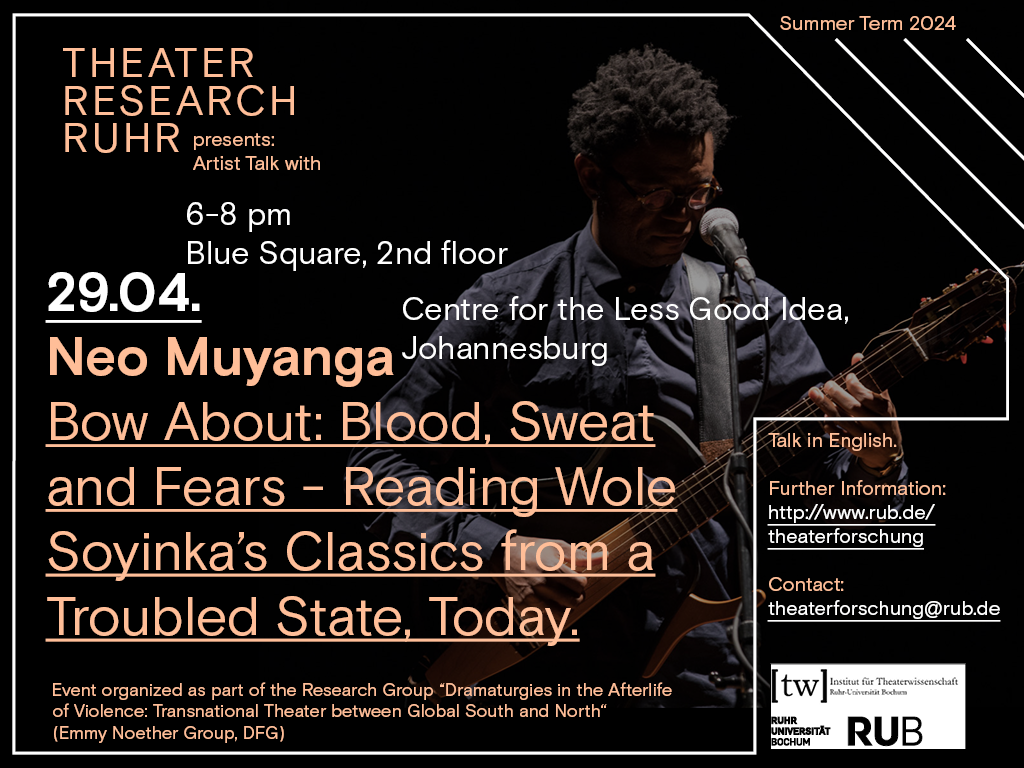
Monday, 29th of April, 6-8pm, BlueSquare, 2nd Floor
Talk in Englisch
Neo Muyanga is a composer and installation artist. His work traverses new opera, improv and African idiomatic song. Having studied the madrigal tradition in Trieste, Italy, Muyanga composes chamber operas, musical pieces and musical works for large and mixed ensembles. He uses a syncretic aesthetic that simultaneously references the traditional singing modes of Basotho and Zulu, free jazz, and the Western baroque. Currently, his research and performance interests include investigations and explorations of the aesthetics of protest song, with a particular focus on opera within the black community in South Africa, and more broadly concerning the history of musical story-telling in the Global South. He splits his time between Cape Town and Johannesburg, where he works as the Impresario at the Centre for The Less Good Idea.
Recently, and as part of his first programme as The Centre’s Impresario, Muyanga arranged and led a staged, accoustic reading of Wole Soyinka’s The Bacchae of Euripides: A Communion Rite. He then moderated an artist dialogue between Wole Soyinka and William Kentridge, wherein the trio discussed the nature of failure, the forms of tragedy and their African manifestations in culture and literature, and the forthcoming collaborative book combining Soyinka’s epic tragic poetry with Kentridge’s drawings.
In “Bow About: Blood, Sweat and Fears – Reading Soyinka’s Classics from a Troubled State, Today” Muyanga will present an account of his reading of Soyinka’s Bacchae, and encourage a collective exploration of its contemporary relevance.
Małgorzata Sugiera (Jagiellonian University Kraków): “Rethinking Posthumanism in the Aftermath of the COVID-19 Pandemic”
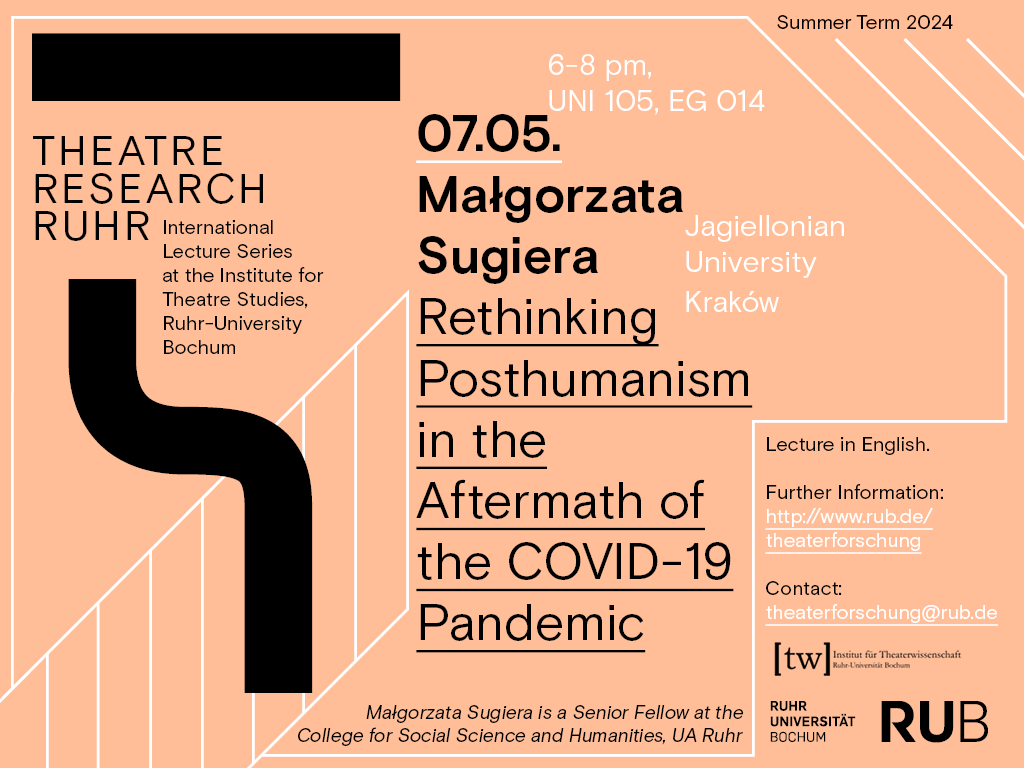
Tuesday, 7th of May, 6-8pm, Universitätsstr. 105, Room: EG 014
Lecture in English
Despite the late-twentieth century posthuman turn in academia that deeply questioned human exceptionalism while trying to apprehend complex entanglements and necessary disentanglements in the more-than-human world, humanities have been increasingly haunted by the concept of the Anthropos as a key-figure of universal humanity. Therefore, after the COVID-19 pandemic it is crucial that humanities use new microbiological and cultural findings on viruses and multispecies relations, which habitually surface during infectious diseases, to rethink the pre-pandemic foundations of the posthumanism. The talk offers a closer look at viruses and the reciprocal capture of scientific-cultural performances out of which they emerge as epistemic, technical-aesthetic objects. This in turn compels a recalibration of multispecies relations and politics on which posthumanist theories are based. Also it necessitates a rethinking not only the concept of Gaia as a main framework of posthumanism but also the related idea of planetary immunity.
Małgorzata Sugiera is a Full Professor at the Jagiellonian University in Cracow, Poland, and Head of the Department for Performativity Studies. She was a Research Fellow of the Alexander von Humboldt Foundation, DAAD, the American Andrew Mellon Foundation, and the International Research Center “Interweaving Performance Cultures” at the Freie Universität in Berlin. Currently, she participates in a six-months Senior Fellowship at the College for Social Science and Humanities within the framework of the University Alliance Ruhr in Essen, carrying out a research project „Performing Waste: To Re-Member Pasts and Speculate Futures“. Her research concentrates on performativity theories, speculative and decolonial studies, particularly in the context of the history of science. She published and co-edited several books in Polish as well as in English and German, most recently Crisis and Communitas: Performative Concepts of Commonality in Arts and Politics (Routledge 2023). She carries out a three-year international research project Epidemics and Communities in Critical Theories, Artistic Practices and Speculative Fabulations of the Last Decades funded by the National Science Centre (NCN).
Walther Maradiegue (FU Berlin): “Performing the Sound Archive: Ethnographies of Listening in the Andes”
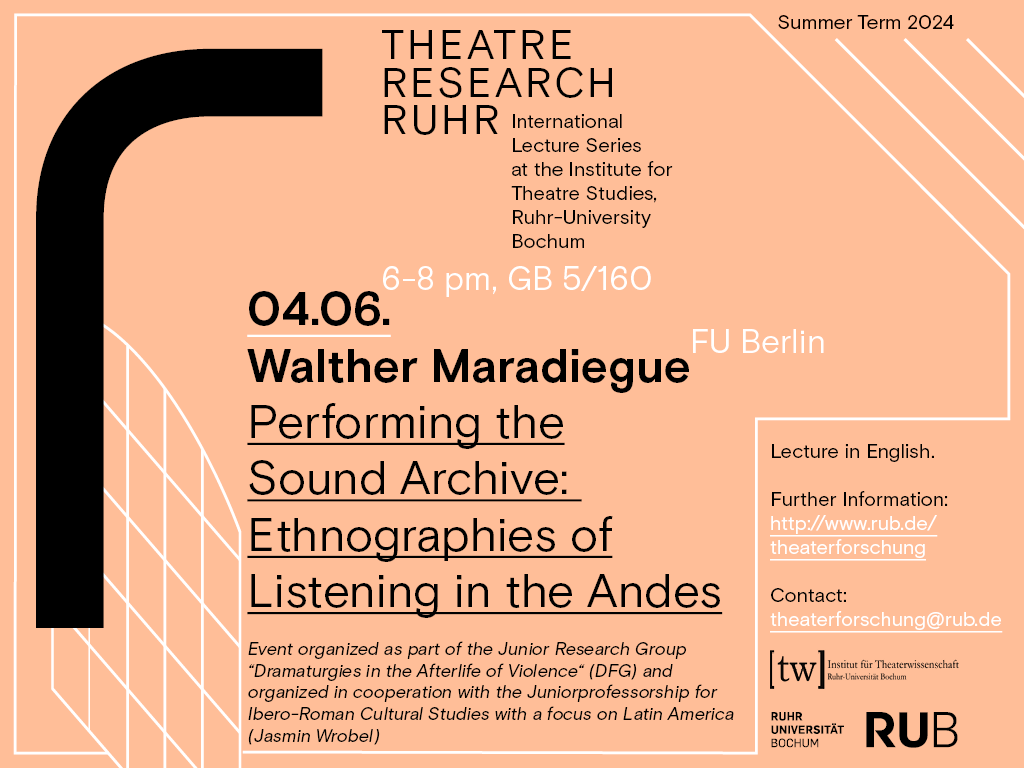
Tuesday, 4th of June, 6-8pm, Campus RUB, Room: GB 5/160
Lecture in English
This presentation argues that the reactivation of an ethnographic sound archive demonstrates performative and aural relations between body and memory, while inscribing historical recordings into contemporary soundscapes. Based on ethnographic research developed in the Northern Peruvian Andes during the last three years, this presentation explores the diverse appropriations and interactions that local dancers, activists, researchers, and musicians make in an ethnographic collection that after 35 years returns to a small town in this region. Sessions of elicitation and collaborative curatorship show that sound archives, while arising from unequal and often colonial conditions of production, can also be sites where unexpected mediations take shape. These mediations speak of the performative character of sound recordings, based on modes of listening that often challenge academic authority and institutions, and suggest collaborative futures for the ethnographic archive.
Walther Maradiegue is an anthropologist ad holds a PhD in Latin American literature and cultural studies (Northwestern University; Dissertation Title: Geographies of Indigeneity: Space and Power in the Andes 1880-1930). Since 2021, he works as a Postdoctoral Researcher at the Freie Universität Berlin as part of the project „Shared Soundscapes: Musical Revitalizations and Identity Politics in Peru,“ funded by the DFG. He is currently working, together with Dr. Gisela Cánepa Koch, on a book manuscript on the relationship between sound archives and cultural politics and the development of collaborative methodologies for the restitution of ethnographic sound archives in the Andes.
He is also interested in contemporary Indigenous literature in Latin America, focusing on Quechua literatures from the Andes and its diasporas. He is working on a book project on modes of writing on/along the land in the Andes during the turn from the 19th to the 20th century, and has compiled a book on Quechua Cañaris Literature together with Indigenous writers from the Northern Peruvian Andes.
Kristin Westphal (Universität Koblenz): „Landschaft als Mitspielerin? Ortsbezogene Performance in ländlichen Räumen“
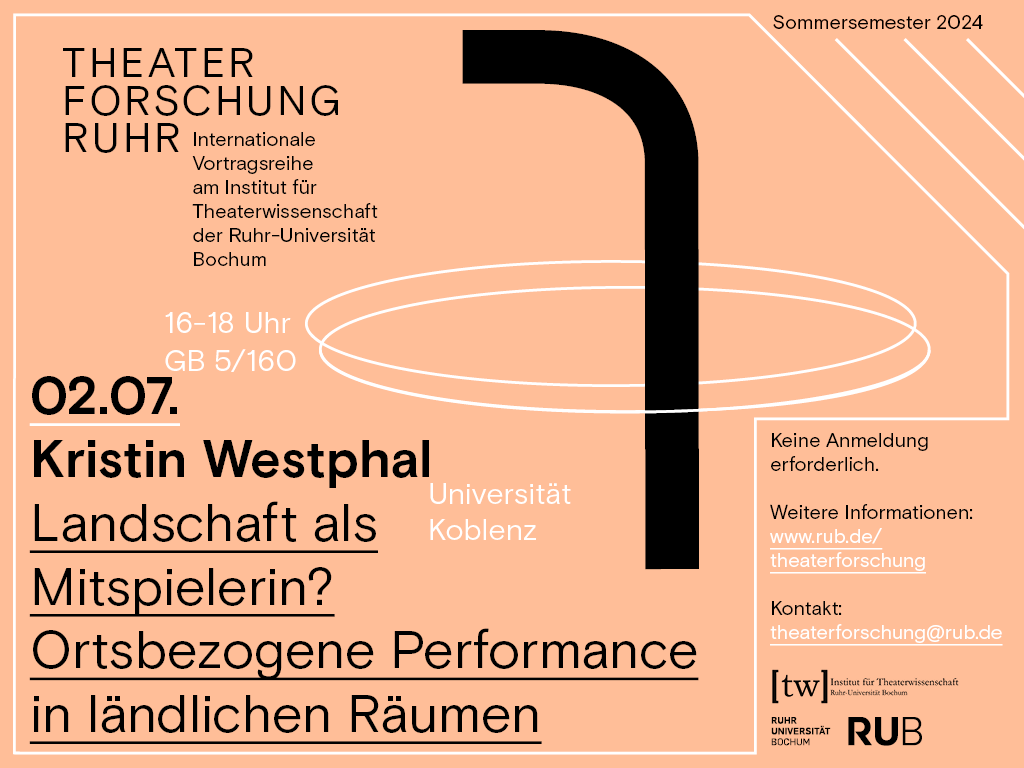
Dienstag, 2. Juli, 16-18 Uhr, Campus RUB, Raum: GB 5/160
zum Videomitschnitt (Passwort auf Anfrage)
Die Zentrierung auf den Anthropos als einzigen Akteur von Geschichte wie Theater ist mit dem Ausruf eines Zeitalters des „Anthropozäns“ in Frage gestellt. Unsere Vorstellungen einer Grenzziehung von Natur und Kultur sind überholt. Kunst und Bildung sind herausgefordert, das Verhältnis von Kultur und Natur radikal zu befragen und neu zu denken. Zu beobachten sind verstärkt Praktiken in den Performancekünsten, die sich einer anthropogenen Zukunft widmen. Sie denken urbane, rurale, industrielle Landschaften mit Performance zusammen. Gestein, Meer und Wald sind dann nicht nur Hintergrund für Performances, sondern erscheinen als Kräfte anderer Formen des Lebens, von denen das Menschliche existenziell abhängig ist. Diese Perspektive rührt in ethischer Hinsicht an die Verantwortung für die Kommenden. Ausgehend von einer Auseinandersetzung mit dem Landschaftsbegriff wird dem Potential zeitgenössischer Performancepraktiken nachgegangen, wirkmächtige Zuschreibungen von Landschaftlichem, Ländlichem anders zu perspektivieren. Und umgekehrt wird anhand eines Beispiels aus einem Forschungsprojekt gefragt, wie der Weg vom kontrollierten Raum des Theaters in das offene Feld andere Formen der Darstellung und Teilhabe hervorbringt, wenn Landschaft zur Mitspielerin wird.
Kristin Westphal, Dr. phil. habil. – Erziehungswissenschaftlerin und Professorin i.R. an der Universität Koblenz, Gründungsmitglied und bis 2019 Leitung des Zentrums für zeitgenössisches Theater und Performancekunst/Studiengang Theater. Netzwerkmitglied Forschung im Kinder- und Jugendtheater. Schwerpunkte: Pädagogische Anthropologie und Phänomenologie; Ästhetik und Bildung: Körper. Bewegung. Raum. Forschungen zur Kulturellen und Ästhetischen Bildung. Aktuelle Mitherausgaben: KIDS ON STAGE. Andere Spielweisen in der Performancekunst. transgenerational. transkulturell. transdisziplinär, Bielefeld 2022; Landschaft – Performance – Teilhabe, Bielefeld 2023; Künstlerische Residenzen in ländlichen Räumen. Un/Doing Difference im Zusammenspiel künstlerischer, sozialer und bildender Prozesse, Weinheim/Basel 2024.
Wintersemester 2023/24
Dr. Mariama Diagne: The Golden Gaze. Naked Show-Offs as Intervention in Diasporic Performance Practices
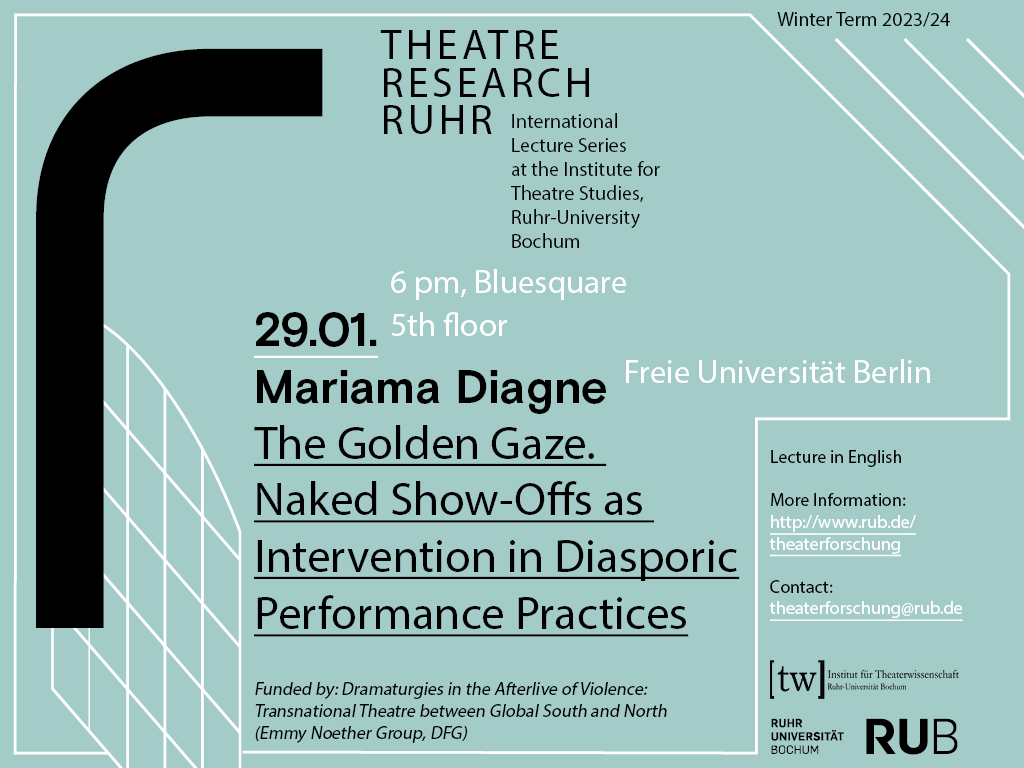
Link zum Video [vimeo] (Passwort auf Anfrage)
29th of January, Bluesquare, 5th floor
Gold is a warm color. At the same time, gold is the precious metal used by cool performance artists, for example in pop music. Gold attracts attention – gold shines – gold is cool. Anyone who can hide their difference and blend in with the crowd is cool. Going underground is cool. Anyone who does something forbidden without losing their nerve is cool. Cool people lose their coolness when they are caught, when they fail, when they are pursued, when protective accessories, from camouflage caps to golden chains, fail and a fragile „I“ – that of the hustler, the struggler, the refugee, the subaltern, the artist – is exposed without protection to the hegemonic forces of those in power. The cool becomes the fool, becomes naked, because the coolness, the hovering between identities within or at the margins of a society that knows neither mercy nor grace, suddenly stops or comes to a brutal standstill.
The lecture “The Golden Gaze. Naked Show-Offs as Intervention in Diasporic Performance Practices” presents selected works by contemporary artists and their diasporic perspectives on constellations of the gaze. It discusses practices of representation through the performative means of nudity, exposing oneself, and the use of gold as a color and accessory in pop music and contemporary dance performance.
Mariama Diagne (Dr. Phil.), is a Berlin-based dance scholar and trained dancer (Dance Theatre of Harlem, New York City). She is a postdoctoral researcher at the Collaborative Research Centre 1512 Intervening Arts (Intervenierende Künste) at the Freie Universität Berlin. In her postdoctoral project „Decolonising Interventions in Choreographies of the Diaspora“, she negotiates the canon of art, theory and cultural history with Afro/Diasporic perspectives. Her publications include: „Schweres Schweben. Qualitäten der gravitas in Pina Bauschs Tanzoper Orpheus und Eurydike“ („Heavy Floating. Qualities of gravitas in Pina Bausch’s dance opera Orpheus and Eurydice“, 2019); „Queering Dance Modernism, Dance Research Journal“ (2022), and „Tanzen Teilen/Sharing Dancing“ (2022), both as co-editor. She moderates projects at art institutions (Ballhaus Naunynstr, Staatsballett Berlin) and accompanies artists on queer and anti-colonial perspectives. She is part of the UNESCO Committee for Intangible Cultural Heritage Germany and a member of the steering committee of the consortium for the National Research Data Infrastructure (NFDI4Culture). From 2019-2023 she was President of the German-speaking Society for Dance Research (gtf).
Dr. Tomaz Amorim Izabel: Extractivism and Modern Brazilian Literature
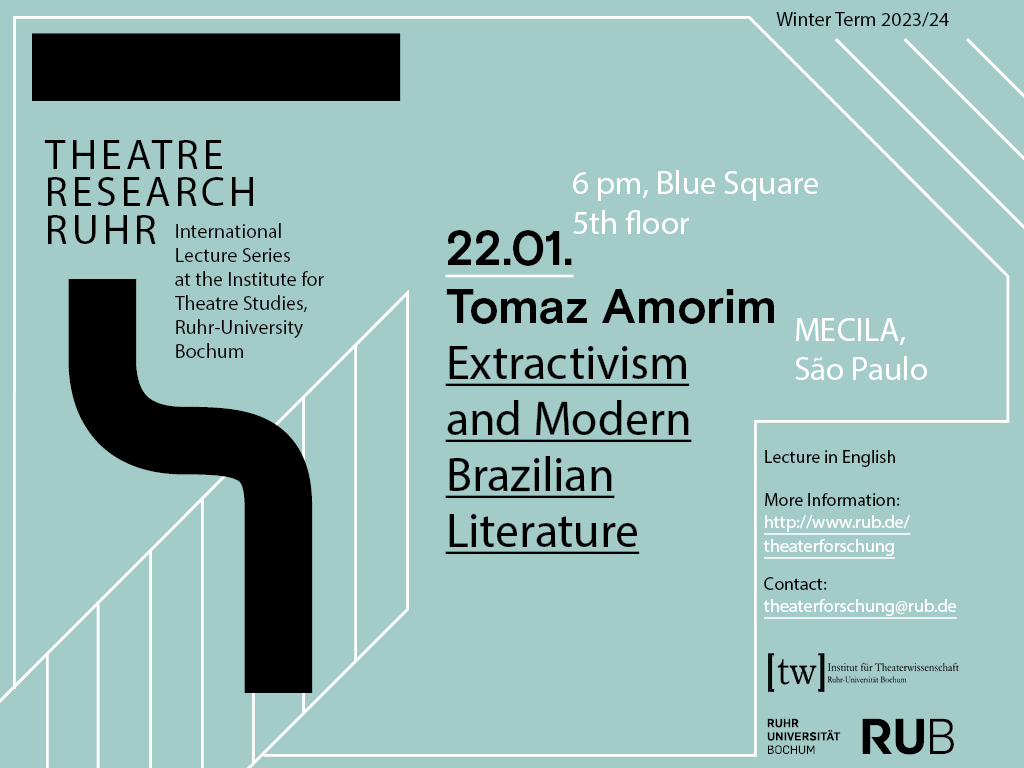
Link zum Video [vimeo] (Passwortauf Anfrage)
22th of January, Bluesquare, 5th floor
The practices of extractivism and neo-extractivism (Svampa) play a structuring role in the economies and social life of Latin American countries (Galeano). In recent years, there has been a growing interest in the presence of commodities (such as iron ore, coffee, latex, and sugarcane) in modern Brazilian literature (Wisnik). Although the theme is already known, given the abundance of these elements in works by authors such as Drummond, Andrade, Cabral, Rego and Amado, new perspectives seek to go beyond mapping the presence of elements linked to extraction structures. Instead, they aim to understand how literature contributes to organizing aesthetic experience in territories of former colonies whose infrastructure is centered around the production and circulation of commodities. In other words, beyond the study of themes, the focus is on comprehending how the extractivist economic structure is reflected, shapes, and is represented (whether critically or uncritically) through literary form, especially in a period of significant aesthetic transformations like the early 20th century. To delve into these themes, the works „Pau-Brasil“ (1925) by Oswald de Andrade and „Um Paraíso Perdido“ (1905) by Euclides da Cunha, addressing coffee and rubber respectively, will be analyzed
Theater Forschung Ruhr presents: Artist Talk mit Va-Bene Elikem Fiatsi [aka crazinisT artisT] (Kumasi/Ghana): „Performance as an Act of Radical Resistance“
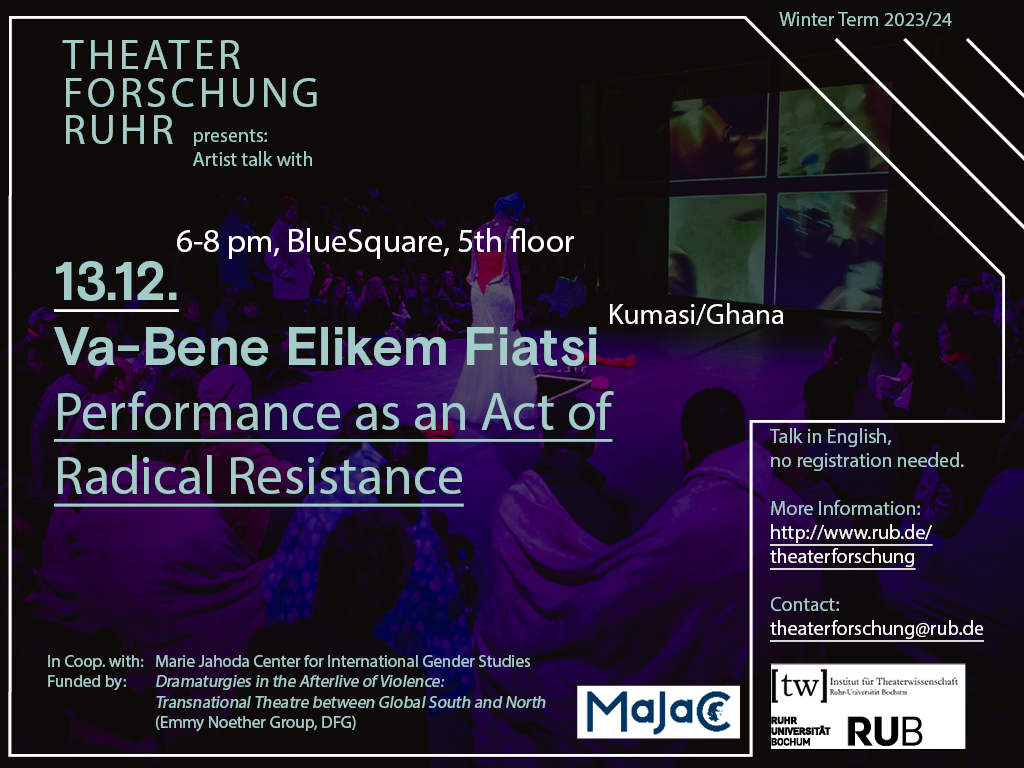
Link zum Video [vimeo] (Passwort auf Anfrage)
Wednesday, 13th of December, 6-8pm, BlueSquare, 5th floor
Moderation: Leon Gabriel & Julia Schade
The artist talk introduces the multidisciplinary work of performance „artivist“ and curator Va-Bene Elikem Fiatsi [aka crazinisT artisT]. Va-Bene is a trans woman with the pronoun sHit if not She. Va-Bene is the founder and artistic director of crazinisT artisT studiO (TTO), Our Railway Cinema Gallery (ORCG) and perfocraZe International Artists Residency (pIAR). As a performer and installation artist, crazinisT investigates gender stereotypes, prejudices, queerness, identity politics and conflicts, sexual stigma and their consequences for marginalised groups or individuals. With rituals and a gender-fluid persona, Va-Bene confronts issues such as disenfranchisement, injustice, violence, objectification, internalised oppression, anti blackness, systemic indoctrination and many more.
Va-Bene co-curated the current exhibition „‚ɔsa nti‘ Because of War – Healing and Resilience Back Home“ which can be visited at Synnika Art Gallery in Frankfurt/Main till 21st of December ( Exhibition Website ).
In particular, the talk will focus on the role of artistic works and residency spaces in endangered environments – such as the ongoing political violence and discrimination against LGBTQIA+ in the state of Ghana and elsewhere. Further information on Va-Bene Elikem Fiatsi.
The artist talk is is organized in cooperation with Marie Jahoda Center for International Gender Studies and part of the Junior Research Group „Dramaturgies in the Afterlife of Violence“ (DFG). Further Information on th Lecture Series Theater Forschung Ruhr: https://theaterwissenschaft.blogs.ruhr-uni-bochum.de/forschung/theater-forschung-ruhr/
Sommersemester 2023
Artist Talk mit Nir Shauloff von Public Movement (Tel Aviv): „The Dance of the State: Public Choreographies in Days of Disbelief“ (Di., 4. Juli, 18-20 Uhr, BlueSquare, 5. Stock)
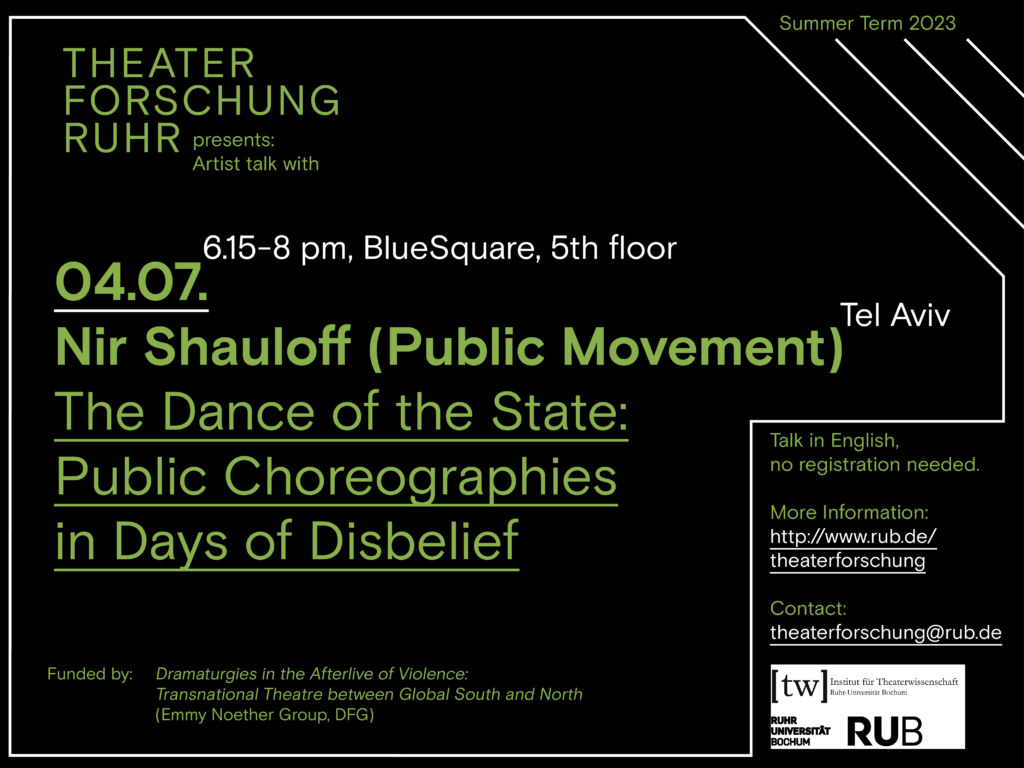
Di., 4. Juli, 18-20 Uhr, BlueSquare, 5. Stock
The artist talk presents the works of the Israeli Performance group Public Movement from the past years, along with their ongoing research on cultural diplomacy, indirect agencies, and the codependency between art and the state. In particular, the talk will focus on „Suspicious Minds,“ a controversial project with and inside of the Israeli Mossad, as a case study for the Public Movement’s methodology. Further information on Public Movement: Link
Vortrag: Siri, who is your mother? Muttersprache und Maschinen (Do., 6. Juli, 18-20 Uhr, BlueSquare, 5. Stock)
Workshop: Wer schreibt? Wer spricht? ChatGPT und Autor*innenschaft (Fr., 7. Juli, 12-15 Uhr, BlueSquare, 5. Stock)
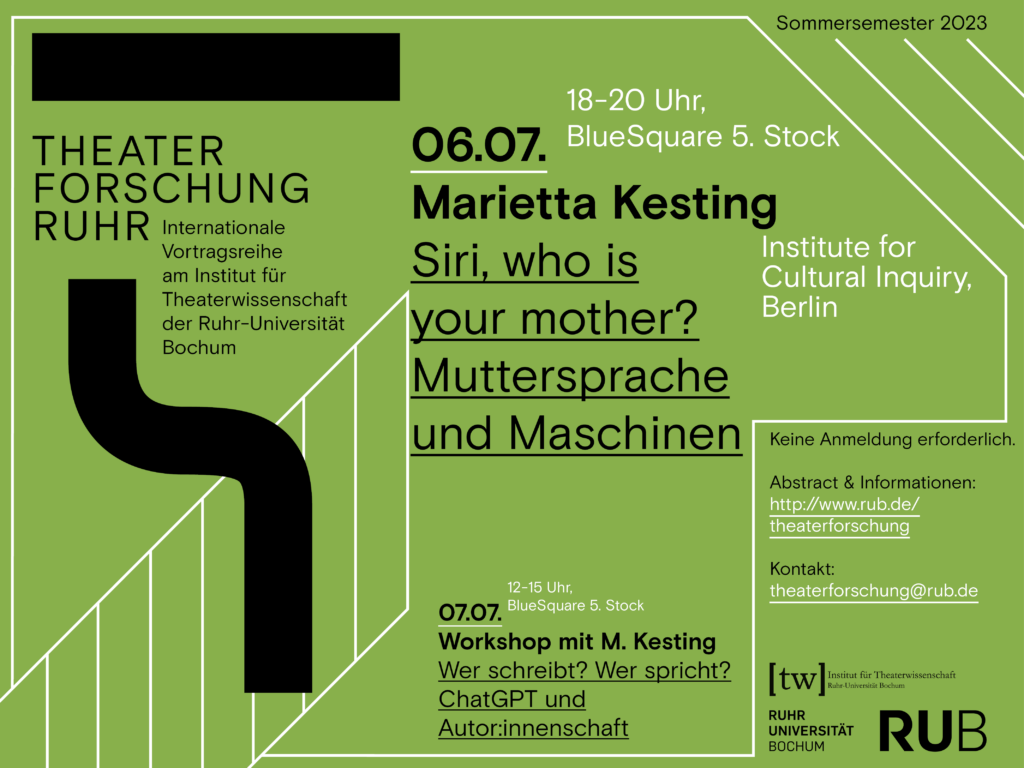
Donnerstag, den 6. Juli, 18-20 Uhr und
Freitag, den 7. Juli, 12-15 Uhr
ChatGPT und die Frage, wie KI unser Leben verändern wird, sind derzeit überall ein heißes Diskussionsthema. Dabei mischen sich kommunikative Wirklichkeitserfahrungen mit negativ und positiv aufgeladenen Phantasien, Ängsten und Hoffnungen. Im Rahmen der Vortragsreihe Theater Forschung Ruhr haben wir die Medien- und Kulturwissenschaftlerin Marietta Kesting eingeladen, die sich in ihrer Forschung mit Bots beschäftigt und dabei Technologie und menschliches Verhalten gleichermaßen in den Blick nimmt. Marietta Kesting wird mit einem Vortrag und am nächsten Tag einem Workshop praktische und theoretische Zugänge zur Interaktion mit(tels) Chatbots anbieten. Vortrag und Workshop finden im Blue Square, 5. Stock statt (Kortumstr. 90, U Rathaus Nord). Sie sind frei und ohne Anmeldung besuchbar.
Marietta Kesting, Medien- Kunst- und Kulturwissenschaftlerin, Forschungskoordinatorin am Institut for Cultural Inquiry ICI, Berlin und Lehrende an der Universität Potsdam. Aktuelle Arbeitsschwerpunkte Immersion, Postkolonialismus und Medien; Künstliche Intelligenz und Ko-Schreiben mit Maschinen; dokumentarische Methoden, Archive und künstlerische Interventionen. Zuletzt erschienen: Human after Man hg. zusammen mit S. Witzgall, diaphanes, Zürich, Berlin, sowie „Speaking Nearby ‚DOCUMENTA FIFTEEN‘ – über queerfeministische Unterströmungen und minoritäre Gesten“ in: Texte zur Kunst online, 5.12.2022, HIER„
Sommersemester 2022
„Industrialisierte Zeit“ mit Julia Schade (Postdoc RUB), Ruth Ewan (Künstlerin), Rachael Rakes (Kuratorin) und Britta Peters (Kuratorin), am 24. April um 19 Uhr in den Rottstr5 Kunsthallen, Bochum (Wandersalon Urbane Künste Ruhr)
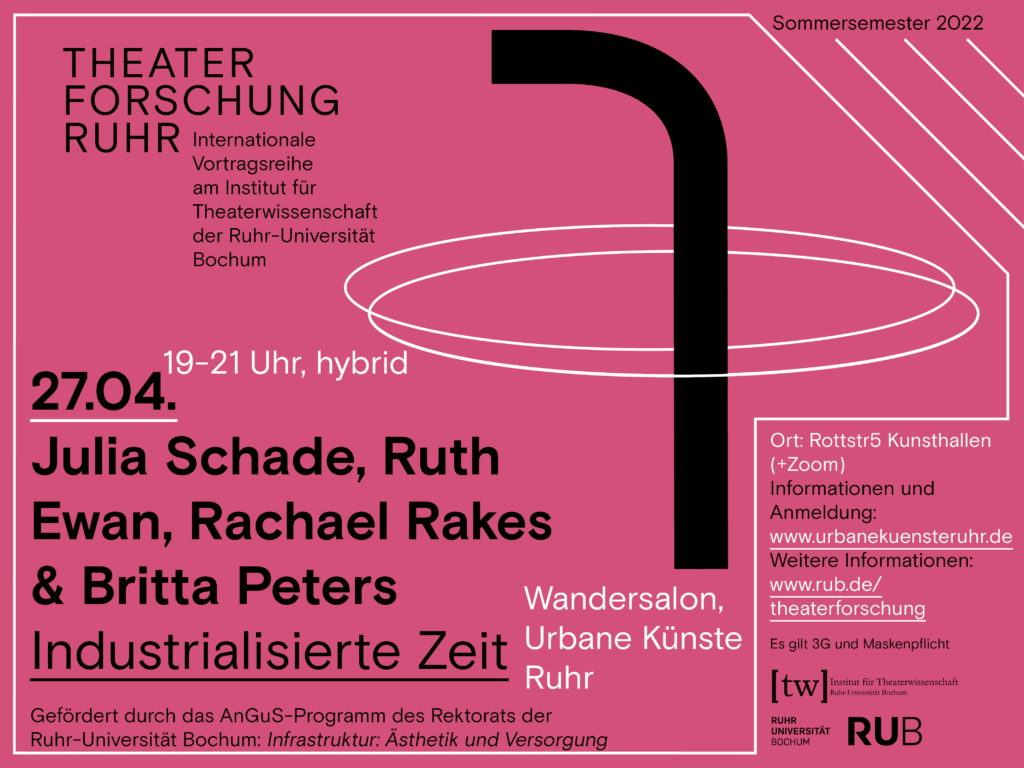
Anhand welcher zeitlichen Strukturen lässt sich das Leben heute organisieren? Während mit Beginn der Industrialisierung Arbeit und Freizeit in streng voneinander unterschiedenen Bereichen der Taktung der Maschinen folgten, entwickelt sich durch die zunehmenden postmateriellen Arbeitsweisen eine neue Zeiteinteilung: Die wachsende Durchdringung aller Lebensbereiche mit dem Digitalen erschwert die Trennung von Privatem und Öffentlichem, ein geschützter Rückzugsort muss durch einen temporären Ausstieg aus den kommunikativen Netzwerken aktiv erkämpft werden. Denn die globale Infrastruktur selbst mit ihrer Option zum pausenlosen Konsum, Arbeiten und Kommunizieren schläft nie.
Mit der Veranstaltung „Industrialisierte Zeit“ möchten wir aus wissenschaftlicher und künstlerischer Sicht die historischen Entwicklungen von zeitlichen Infrastrukturen in den Blick nehmen und über Möglichkeiten und Fluchtpunkte für andere Rhythmen und Skalierungen jenseits linearer Zeitrechnungen spekulieren.
Die Veranstaltung findet hybrid statt.
Gefördert durch das AnGuS-Programm des Rektorats der Ruhr-Universität Bochum.
Anmeldung und weitere Infos: https://www.urbanekuensteruhr.de/de/project/industrialisierte-zeit#industrialisierte-zeit
Wintersemester 2021/22
Im Rahmen der Vortragsreihe „Theater Forschung Ruhr“ stellen internationale Im Rahmen der Vortragsreihe „Theater Forschung Ruhr“ stellen internationale Forscher*innen ihre aktuelle Arbeit in einem wissenschaftlichen Vortrag vor. In diesem – hybriden – Semester gibt es Veranstaltungen in Präsenz und via Zoom.
Wir freuen uns erneut besonders herausragende internationale Forscher*innen zu begrüßen:
- 16. November, 18-20 Uhr: Gerald Raunig (Zürich): „Ungefüge“ (Präsenz, GA 03/149)
- 13. Januar, 18-20 Uhr: Claire Bishop (New York): „Information Overload: Research-Based Art and Attention“ (Zoom)
- 27. Januar, 18-20 Uhr: John Durham Peters (New Haven): Titel t.b.d. (Zoom)
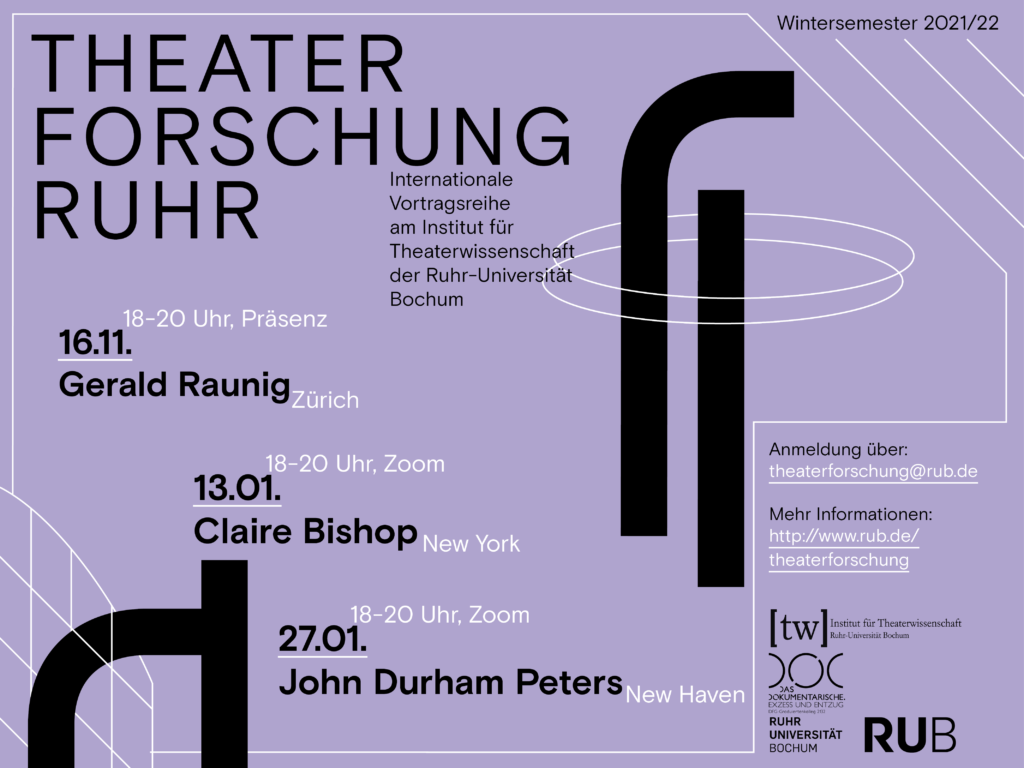
Gerald Raunig (Zürich) „Ungefüge“ am 16. November, 18-20 Uhr, Präsenz (GA 03/149)
In seinem neuen Buch entwickelt Gerald Raunig nicht nur eine konzeptuelle Ökologie von Begriffen des Fugens und Fügens, der Verfügbarkeit und der Unfügsamkeit, sondern unternimmt auch ein Experiment der theoretischen Form. Halbfiktives verwebt sich mit akribisch untersuchten historischen Quellen, mystische Schriften mit Freundesbriefen, philosophische Fragmente mit poetischen Ritornellen. Mehr als eine Erzählung über Ungefüge aus sozialen Umgebungen, Ding- und Geisterwelten, ist das bei transversal texts erschienene Buch selbst formal und inhaltlich eine dividuelle Mannigfaltigkeit.
Ungefüge entfaltet eine wilde Materialfülle der Ungefügigkeit, von der queeren Mystik des Hochmittelalters über die kleinen Stimmen des Falsetts in Jazz und Soul des 20. Jahrhunderts bis zu heutigen Unfugen und Umfugen gegen die glatte Stadt der Ziffer im maschinischen Kapitalismus. In Bochum wird Gerald Raunig
die vielsprachige Übersetzungsmaschinen in al-Andalus als Ausgangspunkt nehmen, um seine Theorie des Ungefüges zu entwickeln.
Das Buch „Ungefüge“ kann kostenlos hier heruntergeladen werden: https://transversal.at/books/ungefuege
Gerald Raunig ist Professor für Philosophie an der Zürcher Hochschule der Künste und arbeitet am eipcp (European Institute for Progressive Cultural Policies), u.a. in der Redaktion der multilingualen Publikationsplattform transversal texts. Seine Bücher sind ins Englische, Serbische, Spanische, Slowenische, Russische, Italienische, Holländische und Türkische übersetzt. Weitere Buchveröffentlichungen in deutscher Sprache: Kunst und Revolution. Künstlerischer Aktivismus im langen 20. Jahrhundert (2005); Tausend Maschinen. Eine kleine Philosophie der Maschine als sozialer Bewegung (2008); Instituierende Praxen. Bruchlinien der Institutionskritik (zus. mit Stefan Nowotny, 2008, Neuauflage 2016); Fabriken des Wissens. Streifen und Glätten 1 (2012); Industrien der Kreativität. Streifen und Glätten 2 (2012) und DIVIDUUM. Maschinischer Kapitalismus und molekulare Revolution, Band 1(2015).
Interessierte können sich via theaterforschung[at]rub.de anmelden. Vor Ort gilt die 3G-Regelung sowie Maskenpflicht.
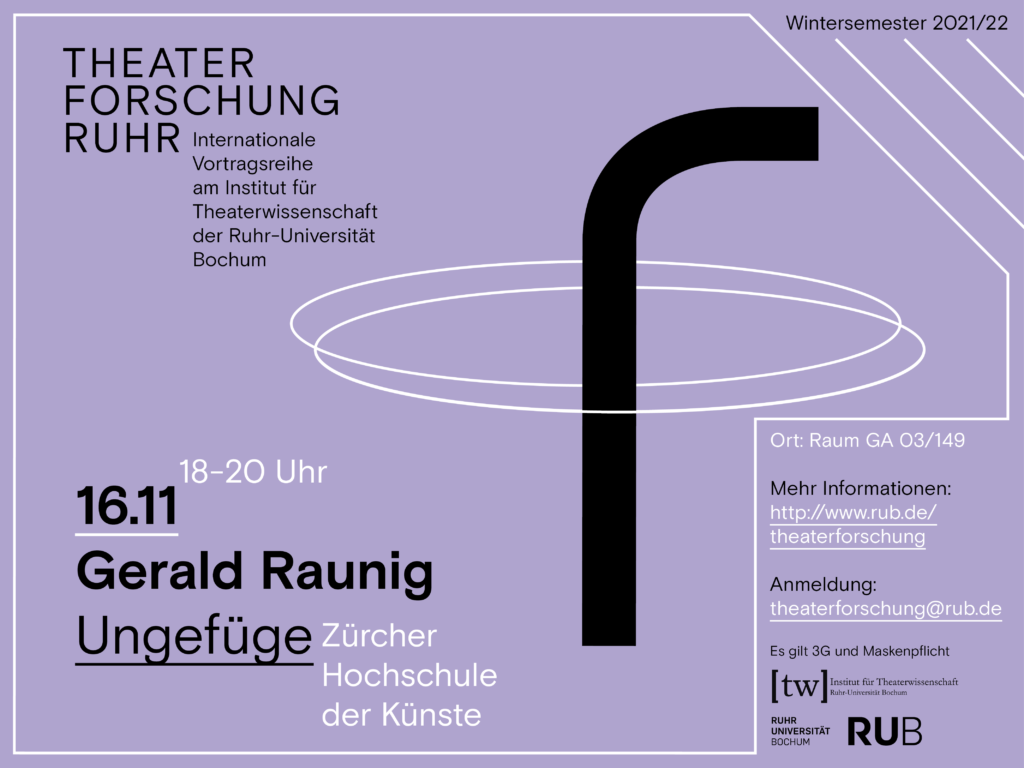
Außerdem findet am 02. und 03.12. ein Workshop zu „Tribunal und Urteilskraft“ in Kooperation mit dem Graduiertenkolleg „Das Dokumentarische“ statt. Im Rahmen dessen gibt es einen öffentlichen Teil:
- 02. Dezember, 15-17 Uhr: Vortrag und Diskussion mit Alexandra Kemmerer (Max-Planck Institut für ausländisches öffentliches Recht und Vökerrecht) „
- Anmeldung über: das-dokumentarische[at]rub.de
- weitere Informationen hier
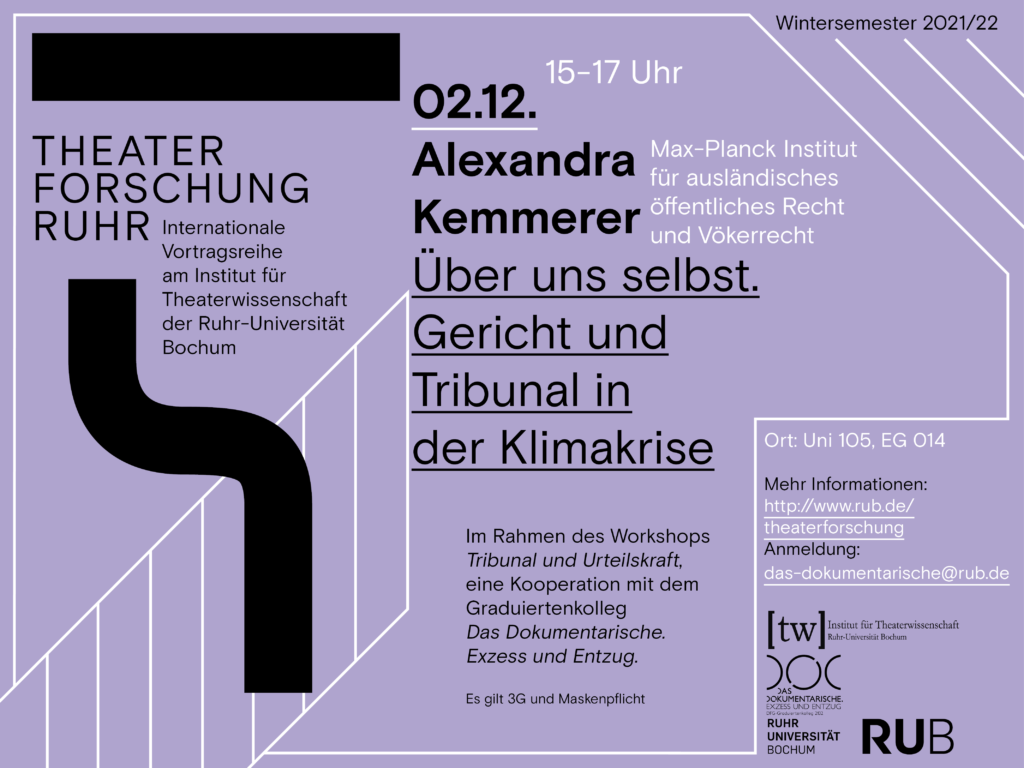
Claire Bishop“Information Overload: Research-Based Art and Attention“ am 13. Januar, 18-20 Uhr, via Zoom
This lecture is a critical survey of “research-based art,” a type of installation practice characterized by the use of text and documents to support an abundance of visual materials, distributed spatially. Claire Bishop offers a genealogy for the emergence of this work in the early 1990s, and chart changes since over the past three decades through the lens of developments in digital technology (the Internet) and the pressures of an attention economy. The paper argues that the innovations of this work in the 1990s—a post-hermeneutic approach to research, a reconfiguration of spectatorship as labour, and an exacerbation of (rather than resistance to) information overload—no longer operate today, and that new approaches to language and storytelling are necessary.
Claire Bishop is a critic and professor in the PhD Program in Art History at the Graduate Center, City University of New York. Her books include Artificial Hells: Participatory Art and the Politics of Spectatorship (Verso, 2012), and Radical Museology, or, What’s Contemporary in Museums of Contemporary Art? (Walther König, 2013). She is a Contributing Editor of Artforum, and her essays and books have been translated into twenty languages. She is currently working on two books: a short publication about Merce Cunningham’s Events, and a collection of essays about contemporary art and attention. Her most recent publication is a book of conversations with Cuban artist Tania Bruguera (Cisneros, 2020).
Registration via theaterforschung[at]rub.de.
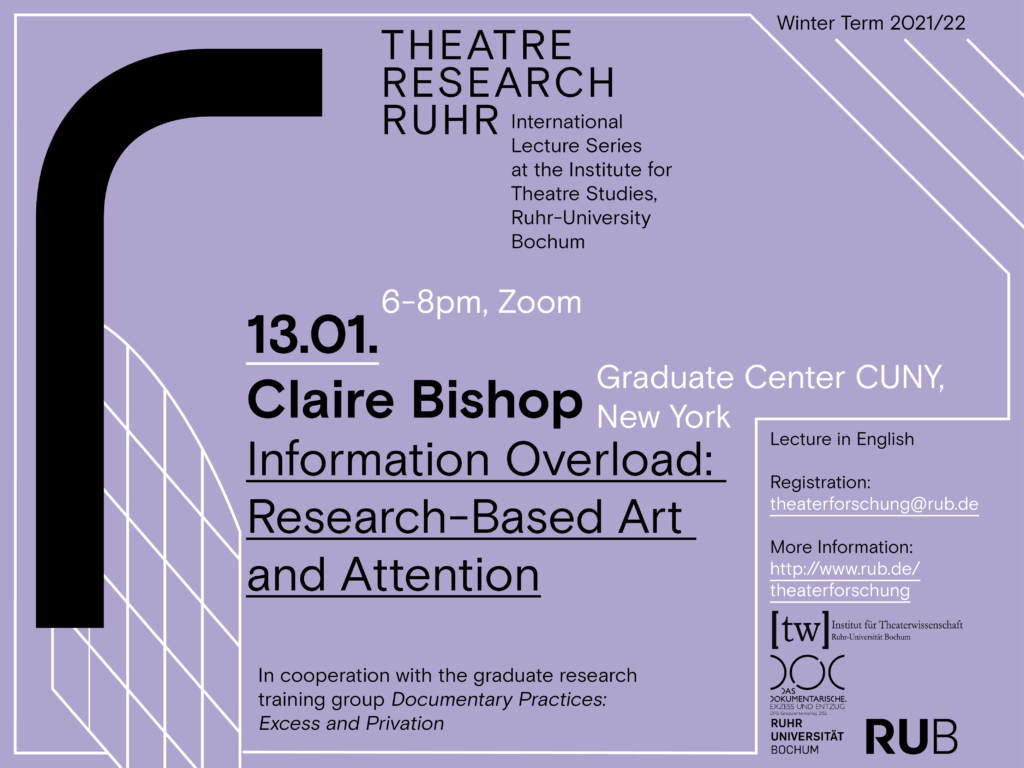
Artist Talk mit Mapa Teatro (Bogotá, Kolumbien), am 26. Januar, 18-20 Uhr via Zoom
Für ein Künstler*innengespräch ist das Kollektiv Mapa Teatro aus Kolumbien digital am Institut zu Gast, um ihr künstlerisches Schaffen und insbesondere ihre Produktion „La Luna en el Amazonas“ vorzustellen, die im Sommer 2021 bei der Ruhrtriennale ihre Premiere feierte. Im Gespräch wird es unter anderem um das Theatermachen vor dem Hintergrund der gewaltsamen Geschichte Kolumbiens und deren Nachlebens gehen, ebenso wie um das Produzieren in transnationalen Kontexten.
Mapa Teatro ist ein transdisziplinär arbeitendes Laboratorium der Künste, welches 1984 in Paris von den Kolumbianer*innen Heidi, Elizabeth und Rolf Abderhalden gegründet wurde. Seit 1986 ist es in Bogotá ansässig. Das Kollektiv hat mit den Jahren eine szenische Praxis der „Kartografien“ geschaffen, die unterschiedlichste Fragestellungen versammelt und sich mit klassischer und zeitgenössischer Dramatik ebenso auseinandersetzt wie mit aktueller Politik in Kolumbien, Geschichtsschreibung und der Idee einer sozialen Imagination. Insbesondere die Gewalt in Kolumbien ist ein zentraler Bezugspunkt der Gruppe in ihrer vierteiligen „Anatomie der Gewalt“ (2010-2018), wofür sie 2018 mit der Goethe-Medaille ausgezeichnet wurden. In ihrer jüngsten Inszenierung „La Luna en el Amazonas“ hat sich Mapa Teatro mit dem Rückzug indigener Gemeinschaften in selbstgewählte Isolation beschäftigt. Ein Akt des Widerstands, im Kampf ums Überleben einer tödlichen Politik, die vor über 300 Jahren ihren Anfang nahm: Männer aus Europa brachen auf, um sich den Planeten untertan zu machen. Die Inszenierung sucht nach den Unsichtbaren, erzählt von freiwilligen und unfreiwilligen Lockdowns und webt aus Geschichten, Gerüchten, Funden und Analysen eine bildreiche Doku-Fiktion.
Die Veranstaltung findet statt im Rahmen des Seminars „Gewalt, Trauma und Darstellbarkeit“ sowie des Forschungsprojektes zu transnationalem Theater zwischen Globalem Süden und Norden (Leon Gabriel). Interessierte sind herzlich eingeladen.
Interessierte können sich via theaterforschung[at]rub.de anmelden.
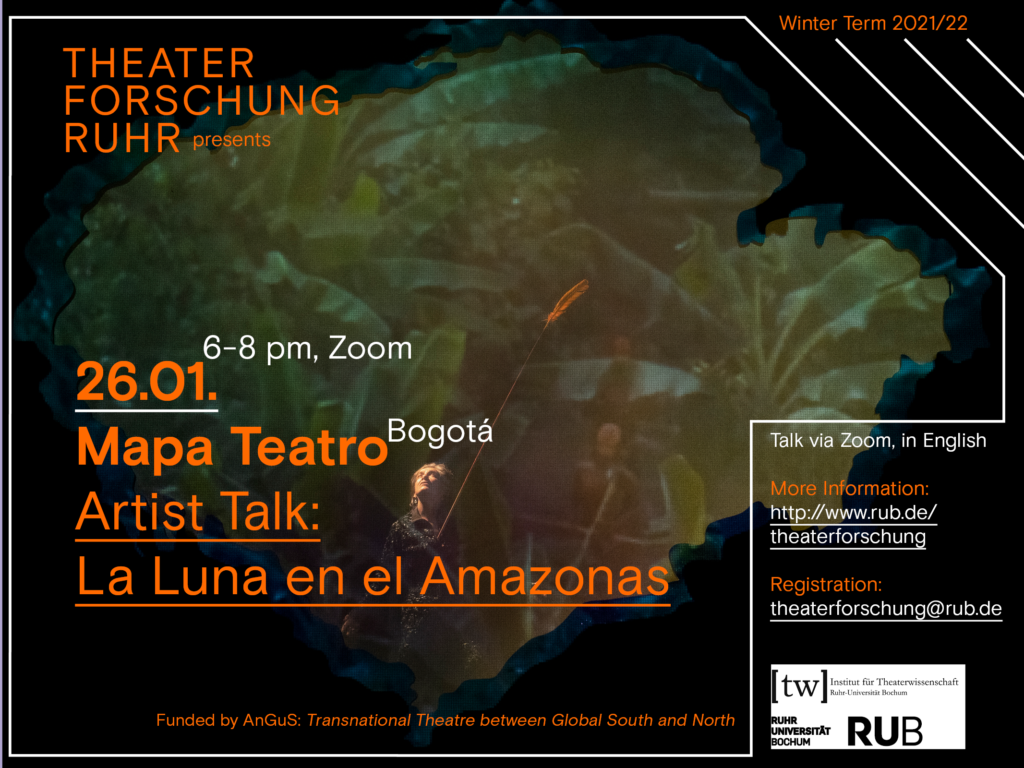
John Durham Peters (Yale University, New Haven): „Infrastructures of Temporal Compilation“, am 27. Januar, 18-20 Uhr, via Zoom
The synchronization of multiple data points–gathered from across time or space–is an epistemic and aesthetic practice that has taken many forms across history and culture. This talk considers case studies from such sources as still life painting, meteorology, oceanography, and astronomy to consider how images and objects are constituted. How do you depict a season? How do you understand a storm? How do you constitute the Pacific Ocean? How to you make an image of a black hole? This talk will consider the infrastructures that make such things possible.
John Durham Peters is María Rosa Menocal Professor of English and Chair of Film and Media Studies at Yale and author, among other books, of The Marvelous Clouds: Toward a Philosophy of Elemental Media (2015), Promiscuous Knowledge: Information, Image, and Other Truth Games in History (2020), co-authored with the late Kenneth Cmiel, and Action at a Distance (2020), co-authored with Florian Sprenger and Christina Vagt.
Registration via theaterforschung[at]rub.de.
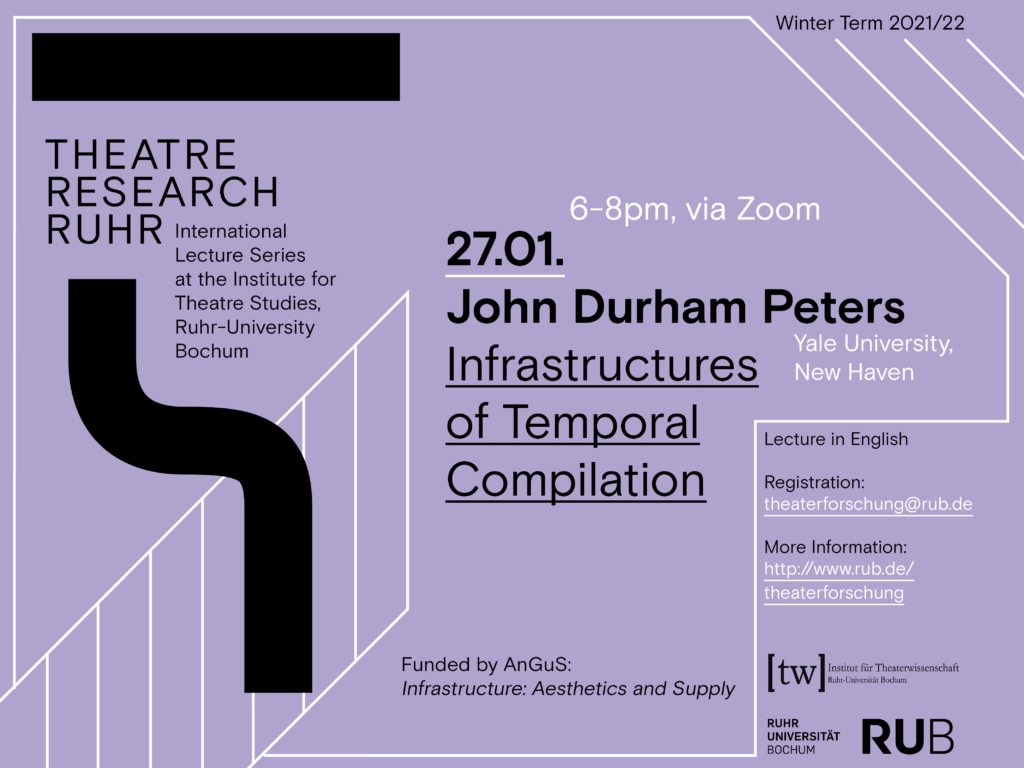
Zu Beginn des Semesters fand am 9. Und 10. Oktober bereits die Tagung „Die Bühne der Vielen“ für und mit Ulrike Haß im Ringlokschuppen, Mülheim, statt.
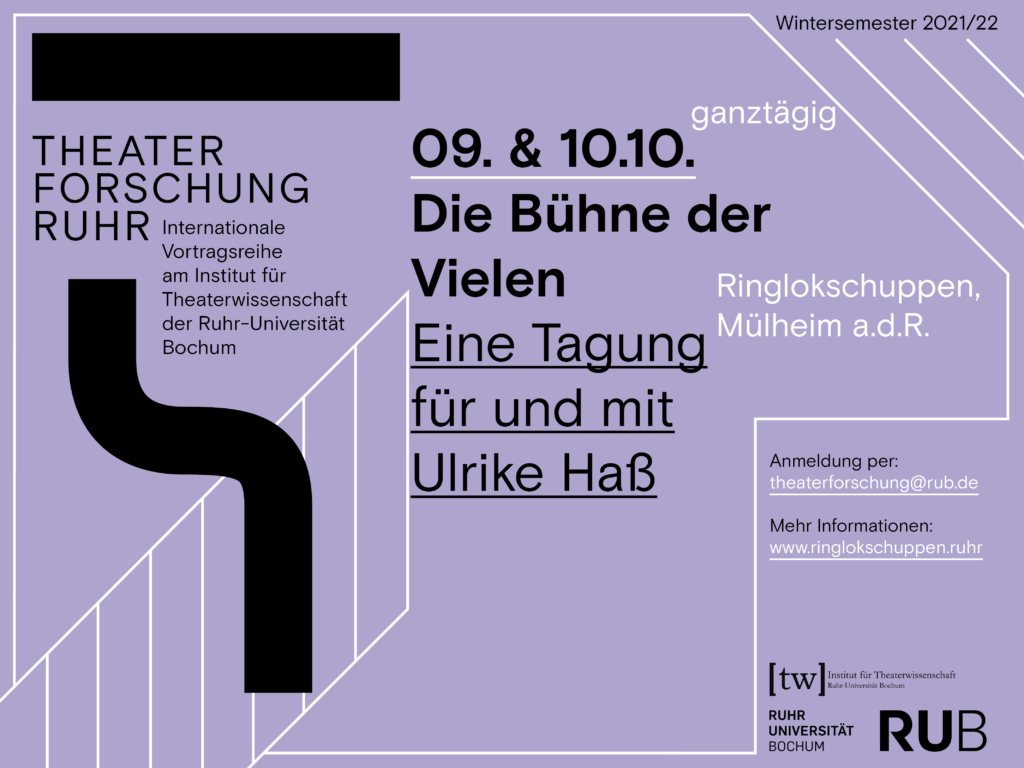
Informationen und Anmeldung zu allen Veranstaltungen: theaterforschung[at]rub.de
Sommersemester 2021
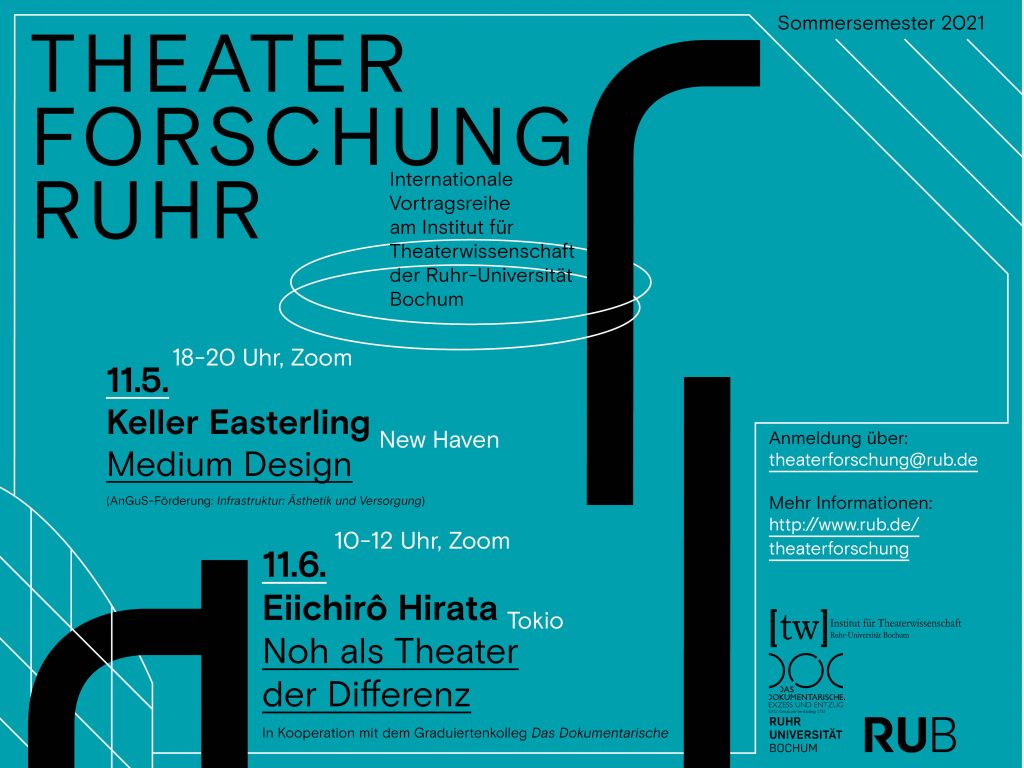
Nach einer einjährigen Pause geht die vierte Ausgabe von „Theater Forschung Ruhr“ nunmehr über Zoom weiter.
Keller Easterling: „Medium Format“
Dienstag, 11.5., 18-20 Uhr, Zoom
Eiichirô Hirata: „Noh als Theater der Differenz“
Freitag, 11.6., 10-12 Uhr, Zoom
- Die Vorträge sind öffentlich und kostenlos. Sie finden in der jeweils angegebenen Sprache des Titels statt.
- Anmeldung zu den Workshops erforderlich unter: theaterforschung@rub.de
- Ausführlichere Informationen zu den Vorträgen erhalten Sie durch Klick auf den Namen der jeweiligen Vortragenden.
- Den Flyer zur internationalen Vortragsreihe „Theater Forschung Ruhr“ gibt es hier als PDF-Datei.
Wintersemester 2019/20
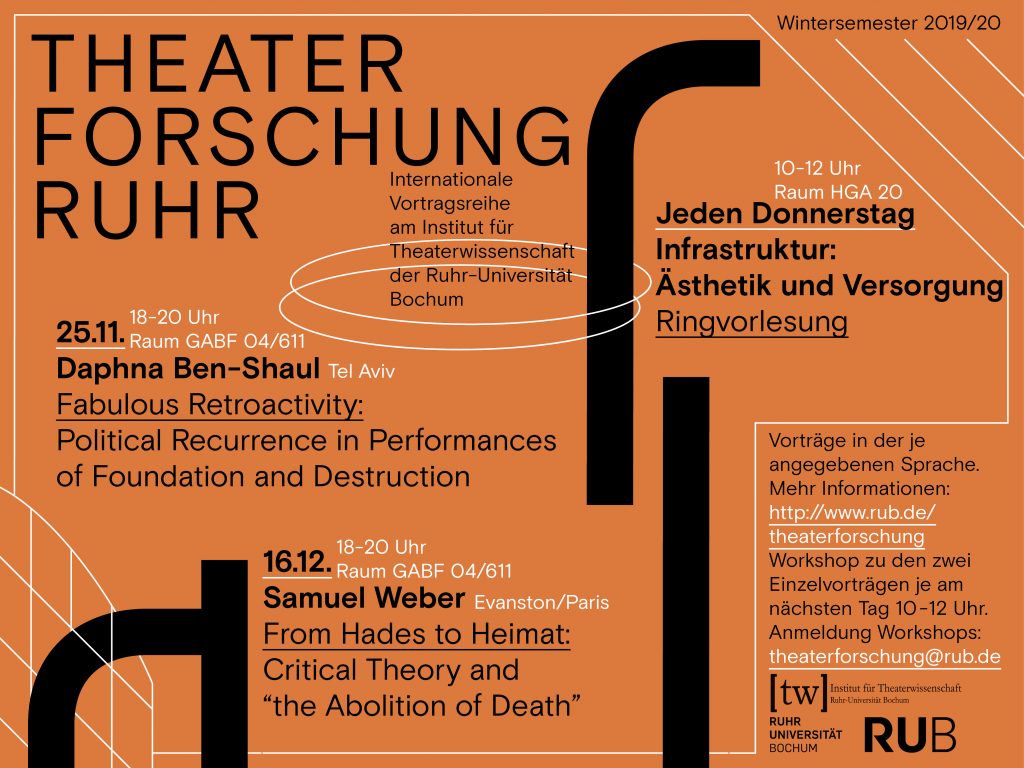
In ihrer dritten Ausgabe beschäftigt sich „Theater Forschung Ruhr“ ausgehend von Dekonstruktion und kritischer Theorie mit dem politischen Verhältnis von Aufbau, Zerstörung und Endlichkeit sowie deren Darstellungspotential. Parallel findet außerdem in diesem Semester eine Ringvorlesung zu „Infrastruktur: Ästhetik und Versorgung“ statt. Die internationale Vortragsreihe und die Ringvorlesung ergänzen sich so gegenseitig.
Daphna Ben-Shaul (Tel Aviv University): „Fabulous Retroactivity: Political Recurrence in Performances of Foundation and Destruction“
Montag, 25.11.2019, 18-20 Uhr, Raum GABF 04/611
Workshop mit D. Ben-Shaul am 26. November 10-12 Uhr
Samuel Weber (Northwestern University, Evanston/Paris): „From Hades to Heimat: Critical Theory and »the Abolition of Death«“
Montag, 16.12.2019, 18-20 Uhr, Raum GABF 04/611
Workshop mit S. Weber am 17. Dezember 10-12 Uhr
Ringvorlesung: „Infrastruktur: Ästhetik und Versorgung“
Jeden Donnerstag, 10-12 Uhr, Raum HGA 20
Begleitseminar zur Ringvorlesung jeden Donnerstag 12-14 Uhr mit Jörn Etzold und Kai van Eikels in Raum GABF 05/608
- Die Vorträge sind öffentlich und kostenlos. Sie finden in der jeweils angegebenen Sprache des Titels statt.
- Anmeldung zu den Workshops erforderlich unter: theaterforschung[at]rub.de
- Ausführlichere Informationen zu den Vorträgen erhalten Sie durch Klick auf den Namen der jeweiligen Vortragenden.
- Den Flyer zur internationalen Vortragsreihe „Theater Forschung Ruhr“ gibt es hier als PDF-Datei.
Sommersemester 2019
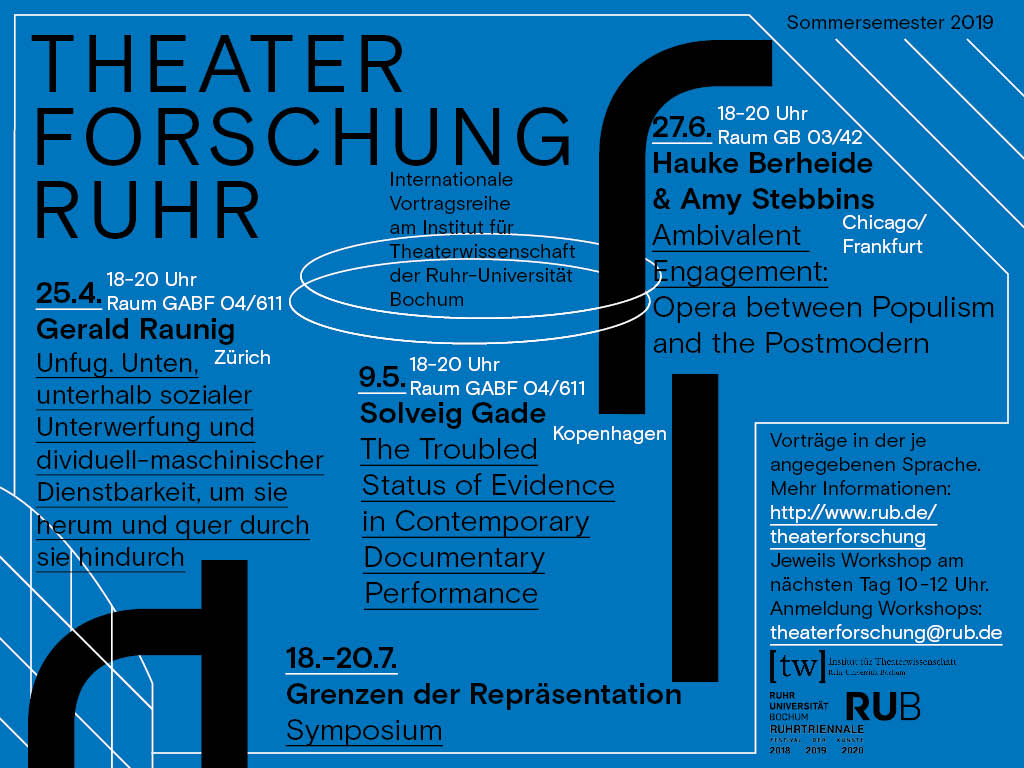
Im Sommersemester 2019 geht die Vortragsreihe „Theater Forschung Ruhr“ in die zweite Runde und widmet sich politischen Fragestellungen, die sich an der Schnittstelle von Umbrüchen und Unsicherheiten der Arbeitswelt, der Krise der (demokratischen) Repräsentation und dem Aufkommen neuer Populismen bewegen — dabei wird auch die Frage spezifischer Dramaturgien und der Umgang mit dokumentarischem oder fingiertem szenischem Material im Vordergrund stehen.
Gerald Raunig (Zürcher Hochschule der Künste): „Unfug. Unten, unterhalb sozialer Unterwerfung und dividuell-maschinischer Dienstbarkeit, um sie herum und quer durch sie hindurch“
Donnerstag, 25.04. 2019, 18-20 Uhr, Raum GABF 04/611
Workshop mit G. Raunig: Freitag, 26.04.2019, 10-12 Uhr, Raum GABF 05/608
Solveig Gade (Danish National School for Performing Arts, Kopenhagen): „The Troubled Status of Evidence in Contemporary Documentary Performance“
Donnerstag, 09.05.2019, 18-20 Uhr, Raum GABF 04/611
Workshop mit S. Gade: Freitag, 10.05.2019, 10-12 Uhr, Raum GABF 05/608
Hauke Berheide & Amy Stebbins (Chicago/Frankfurt): „Ambivalent Engagement: Opera between Populism and the Postmodern“
Donnerstag, 27.06.2019, 16-18 Uhr, Raum GB 03/42
Workshop mit H. Berheide und A. Stebbins: Freitag, 28.06.2019, 10-12 Uhr, Raum GABF 05/608
Symposium in Kooperation mit der Ruhrtriennale und dem Institut für Medienwissenschaft der RUB: „Grenzen der Repräsentation“
Donnerstag, 18.- Samstag, 20.07.2019, ganztägig, Turbinenhalle der Jahrhunderthalle Bochum (plus ggf. Tor5)
- Die Vorträge sind öffentlich und kostenlos. Sie finden in der jeweils angegebenen Sprache des Titels statt.
- Anmeldung zu den Workshops erforderlich unter: theaterforschung@rub.de
- Ausführlichere Informationen zu den Vorträgen erhalten Sie durch Klick auf den Namen der jeweiligen Vortragenden.
- Den Flyer zur internationalen Vortragsreihe „Theater Forschung Ruhr“ gibt es hier als PDF-Datei.
Wintersemester 2018/19
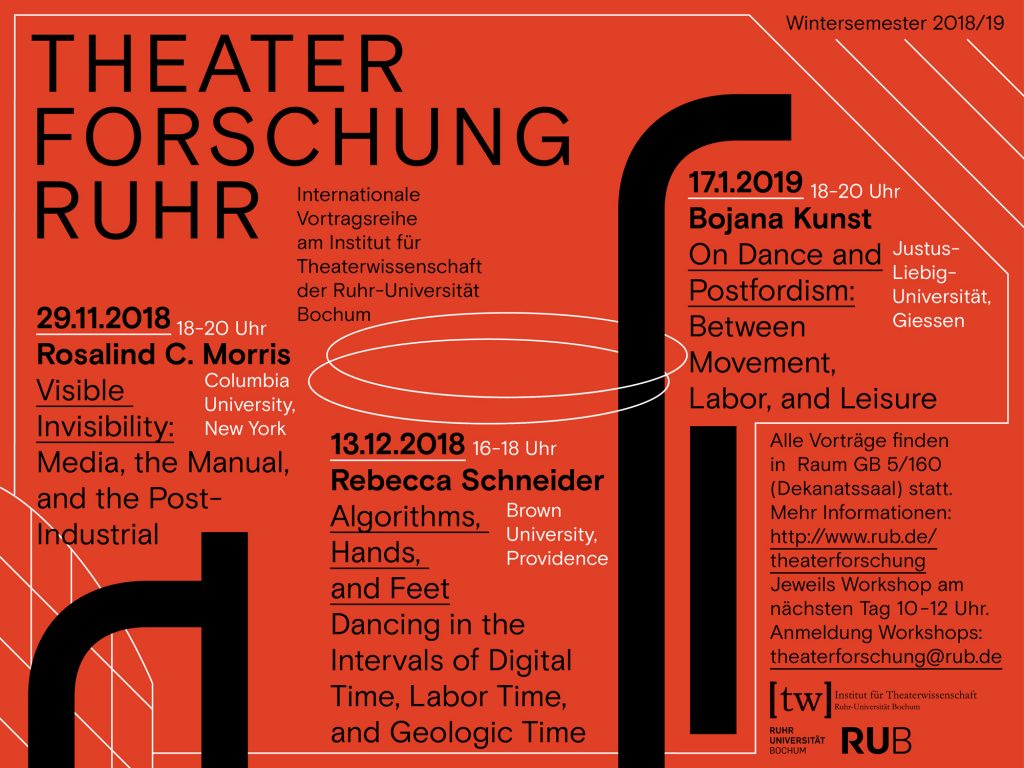
Mit der internationalen Vortragsreihe „Theater Forschung Ruhr“ startet im Wintersemester ein neues Format in Lehre und Forschung am Institut für Theaterwissenschaft der Ruhr-Universität Bochum: Namhafte Forscherinnen und Forscher stellen ihre aktuelle Arbeit in einem öffentlichen wissenschaftlichen Vortrag vor, in einem am nächsten Tag daran anschließenden Workshop wird die Diskussion mit den fortgeschrittenen Studierenden vertieft.
Den ersten Schwerpunkt der Reihe bildet dabei das Verhältnis von Theater und (Post-)Industrie: In der räumlichen Umnutzung von Industrieräumen zu Theatern, in Körpertechniken und ihrer Aufnahme im Theater, in der Darstellung von Arbeit oder ihrer Unsichtbarkeit, im Verhältnis von Arbeitsumwelten und Gender, in technischen Umwelten von menschlichen und nicht-menschlichen Akteuren. Wie werden diese Themen in den darstellenden Künsten verhandelt und in einem internationalen Forschungskontext reflektiert? Was verbindet die Theaterregion Ruhr mit anderen (ehemals) industriell geprägten Zonen? Was ist spezifisch? Wo kann eine Theaterforschung ansetzen, die sich den Potentialen aber auch Problemen im Umgang mit den viel zitierten „Industriekathedralen“ genauso wie den postfordistischen, neuen Arbeitsweisen stellt?
Im ersten Semester der Vortragsreihe sind die Anthropologin Rosalind Morris von der Columbia University New York, die Theaterwissenschaftlerin Rebecca Schneider von der Brown University Providence (Rhode Island) und die Theaterwissenschaftlerin Bojana Kunst von der Justus-Liebig Universität Gießen eingeladen. Die Reihe wird in den nächsten Semestern fortgeführt und kontinuierlich weiterentwickelt.
Rosalind C. Morris (Columbia University, New York): „Visible Invisibility: Media, the Manual, and the Post-Industrial“
Donnerstag, 29.11.2018, 18-20 Uhr, GB 5/160 (Dekanatssaal)
Workshop am 30.11.2018, 10-12 Uhr (GABF 05/608)
Rebecca Schneider (Brown University, Providence): „Algorithms, Hands, and Feet: Dancing in the Intervals of Digital Time, Labor Time, and Geologic Time“
Donnerstag, 13.12.2018, 16-18 Uhr, GB 5/160 (Dekanatssaal)
Workshop am 14.12.2018 , 10-12 Uhr (GABF 05/608)
Bojana Kunst (Justus-Liebig Universität, Gießen): „On Dance and Postfordism: Between Movement, Labour and Leisure“
Donnerstag, 17.1.2019, 18-20 Uhr, GB 5/160 (Dekanatssaal)
Workshop am 18.1.2019, 10-12 Uhr (GABF 05/608)
- Die Vorträge sind öffentlich und kostenlos. Sie finden in der jeweils angegebenen Sprache des Titels statt.
- Anmeldung zu den Workshops erforderlich unter: theaterforschung@rub.de
- Ausführlichere Informationen zu den Vorträgen erhalten Sie durch Klick auf den Namen der jeweiligen Vortragenden.
- Den Flyer zur internationalen Vortragsreihe Theater Forschung Ruhr gibt es hier als PDF-Datei.
